Competitive Event Descriptions
DECA Presentations
Click on the presentation name above to jump to that section.
COMPETITIVE EVENTS 101
PREVIEW
What does this presentation include?

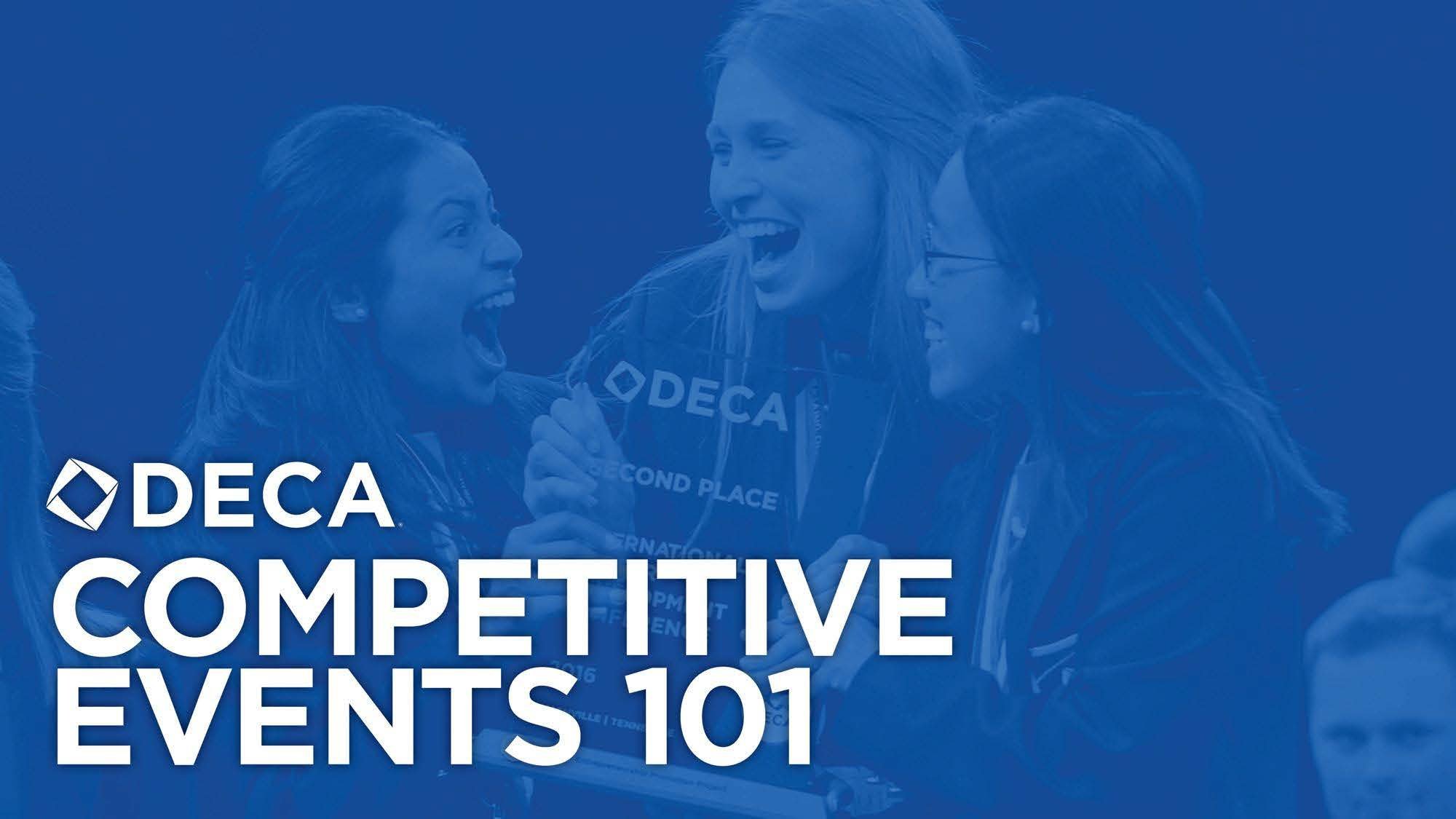

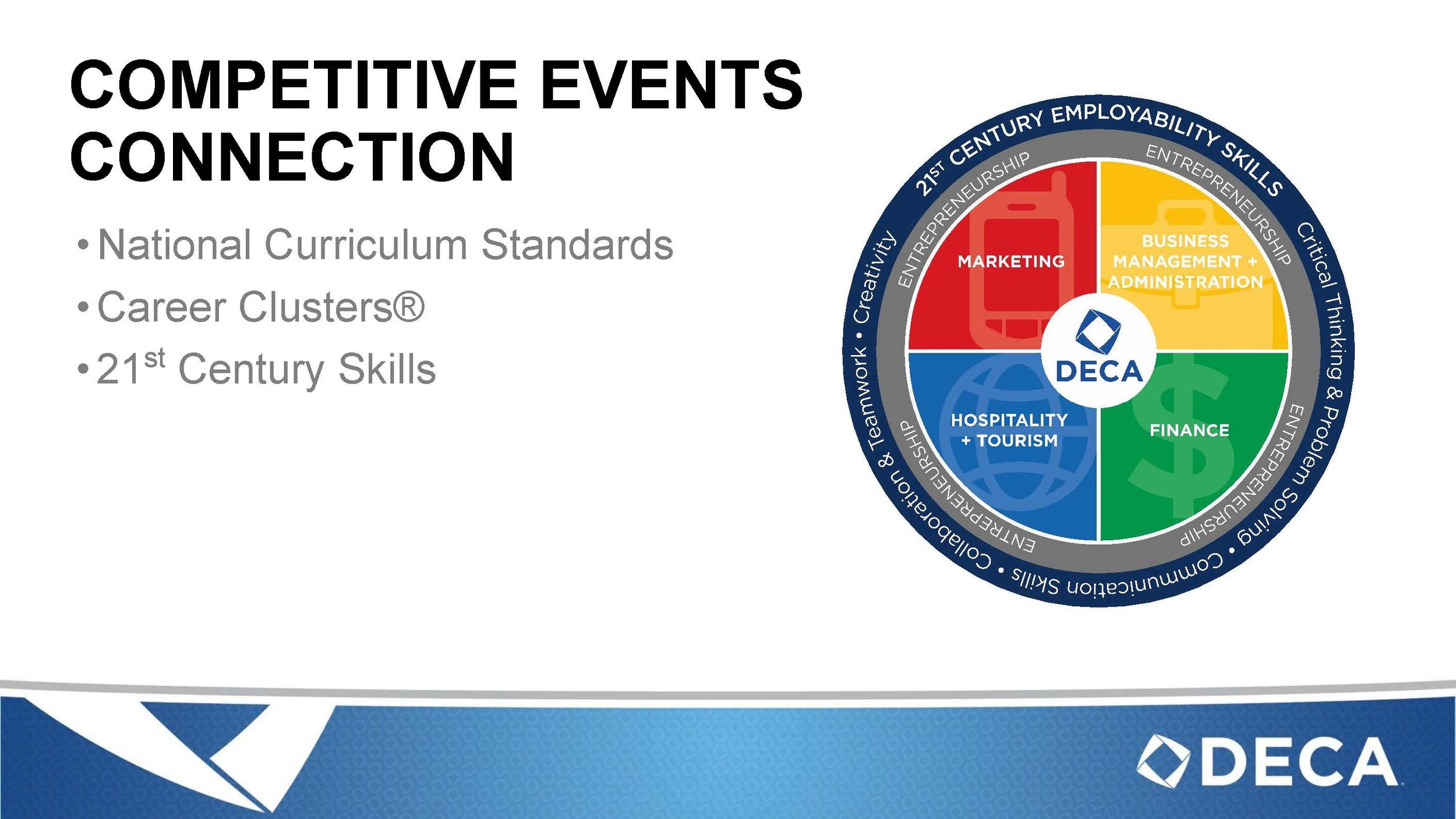
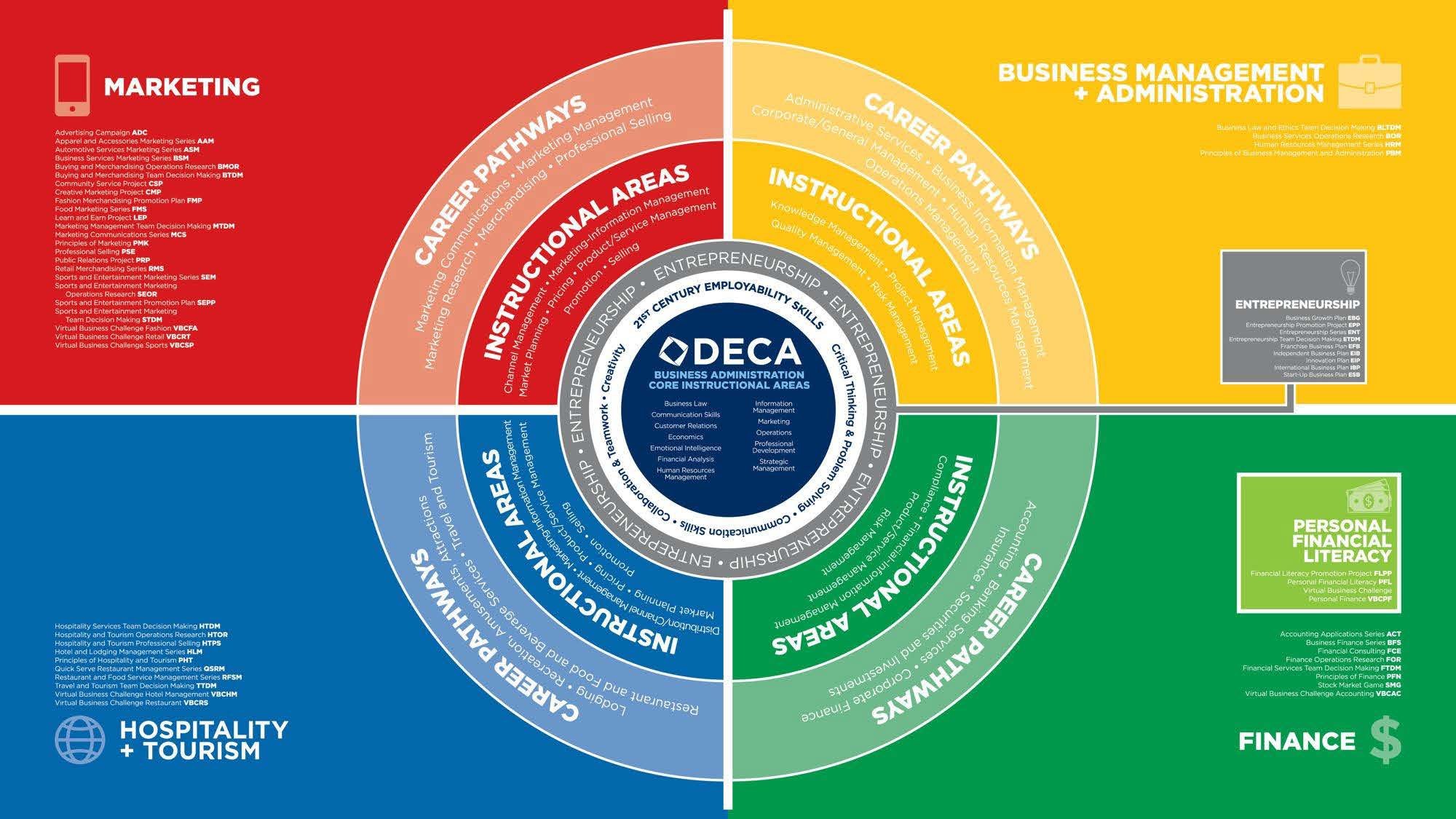
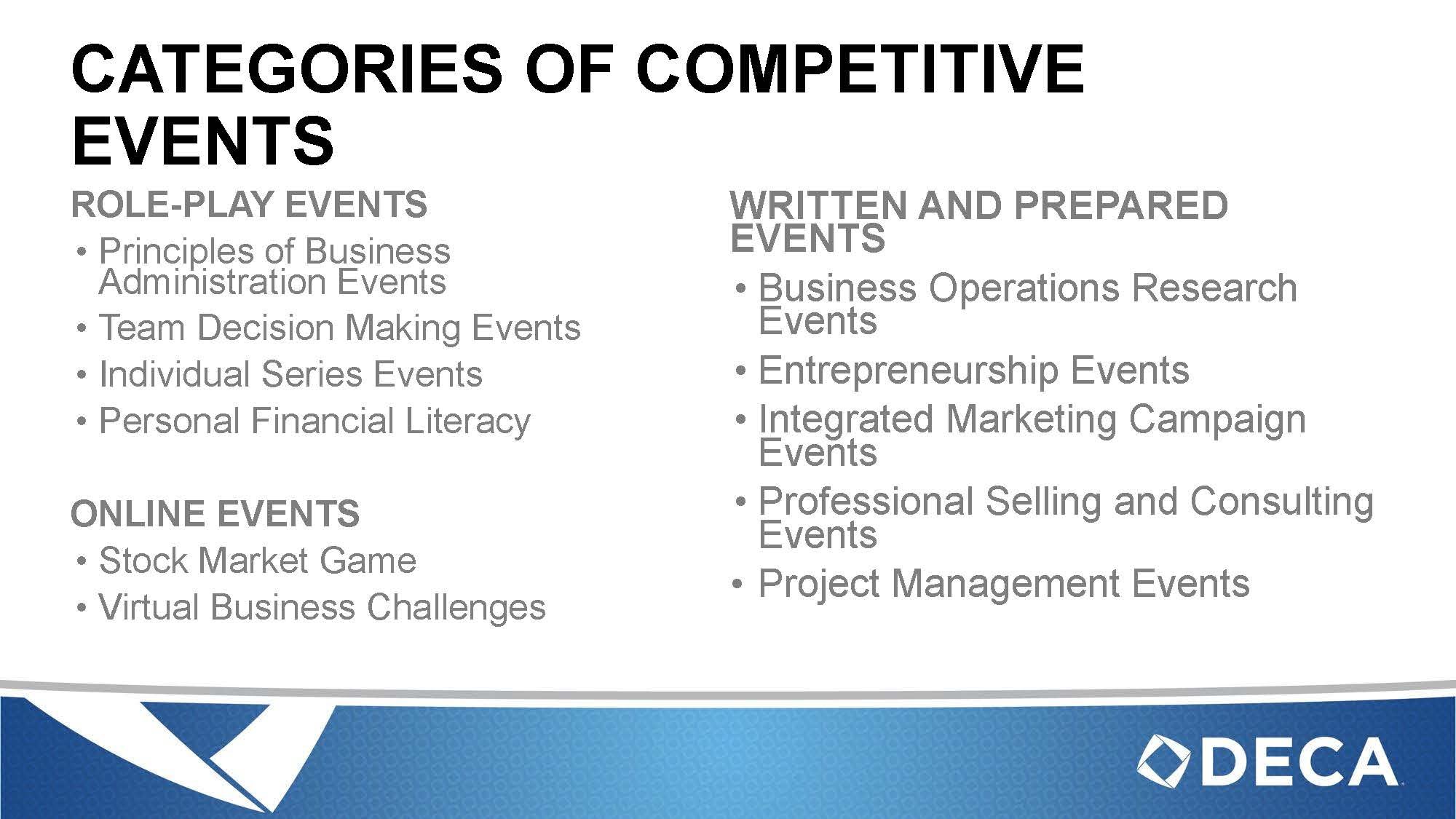
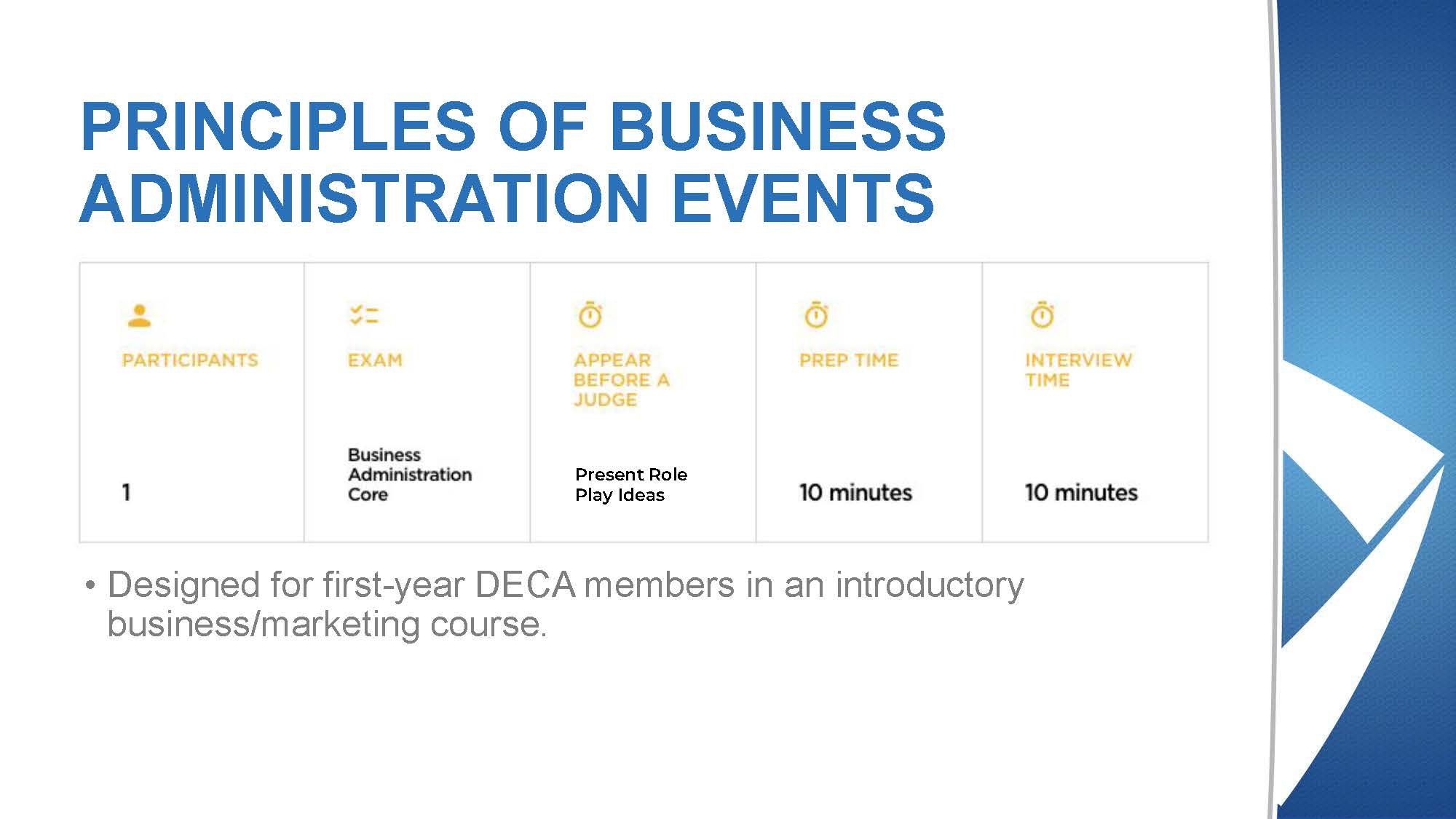
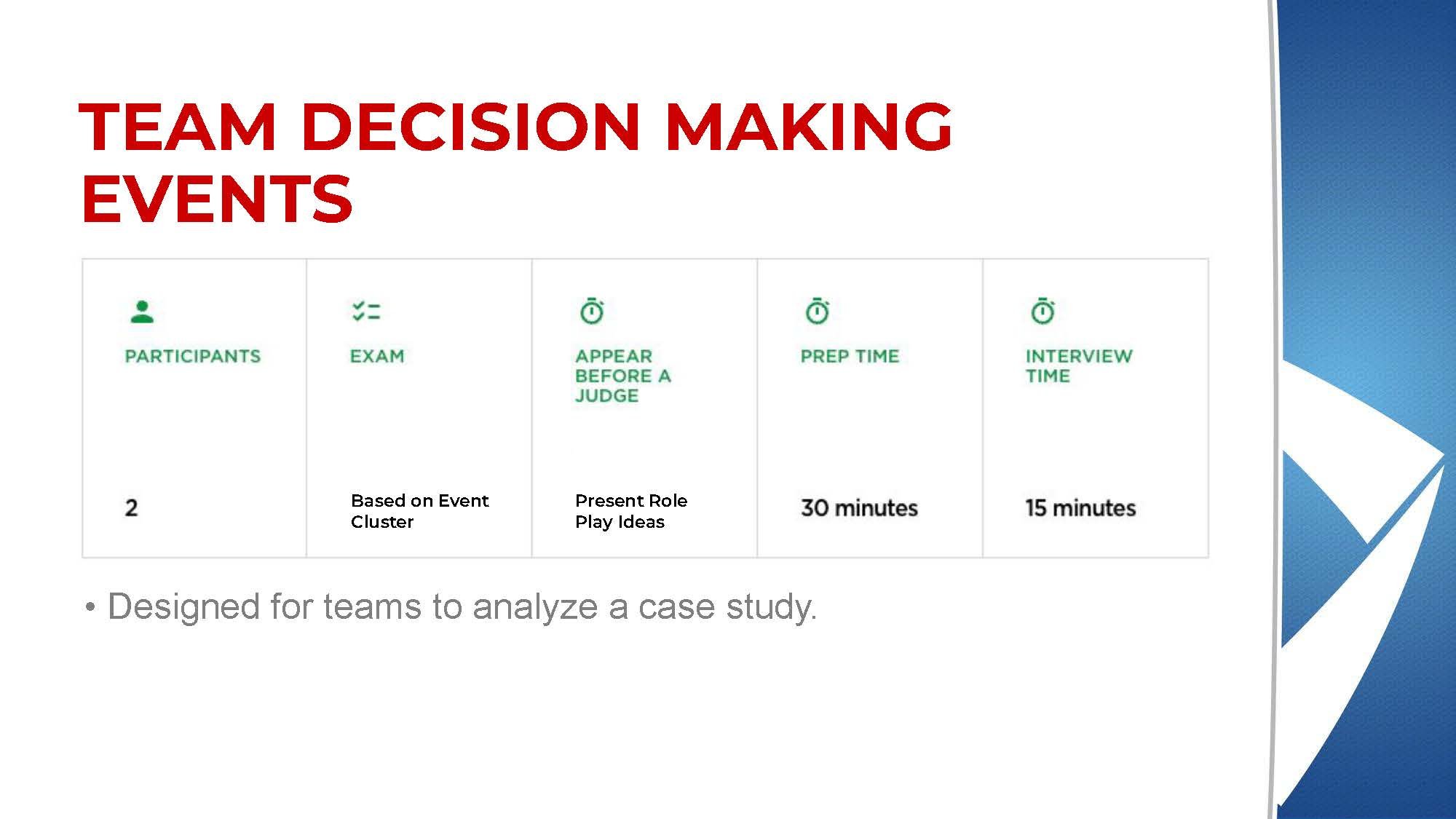
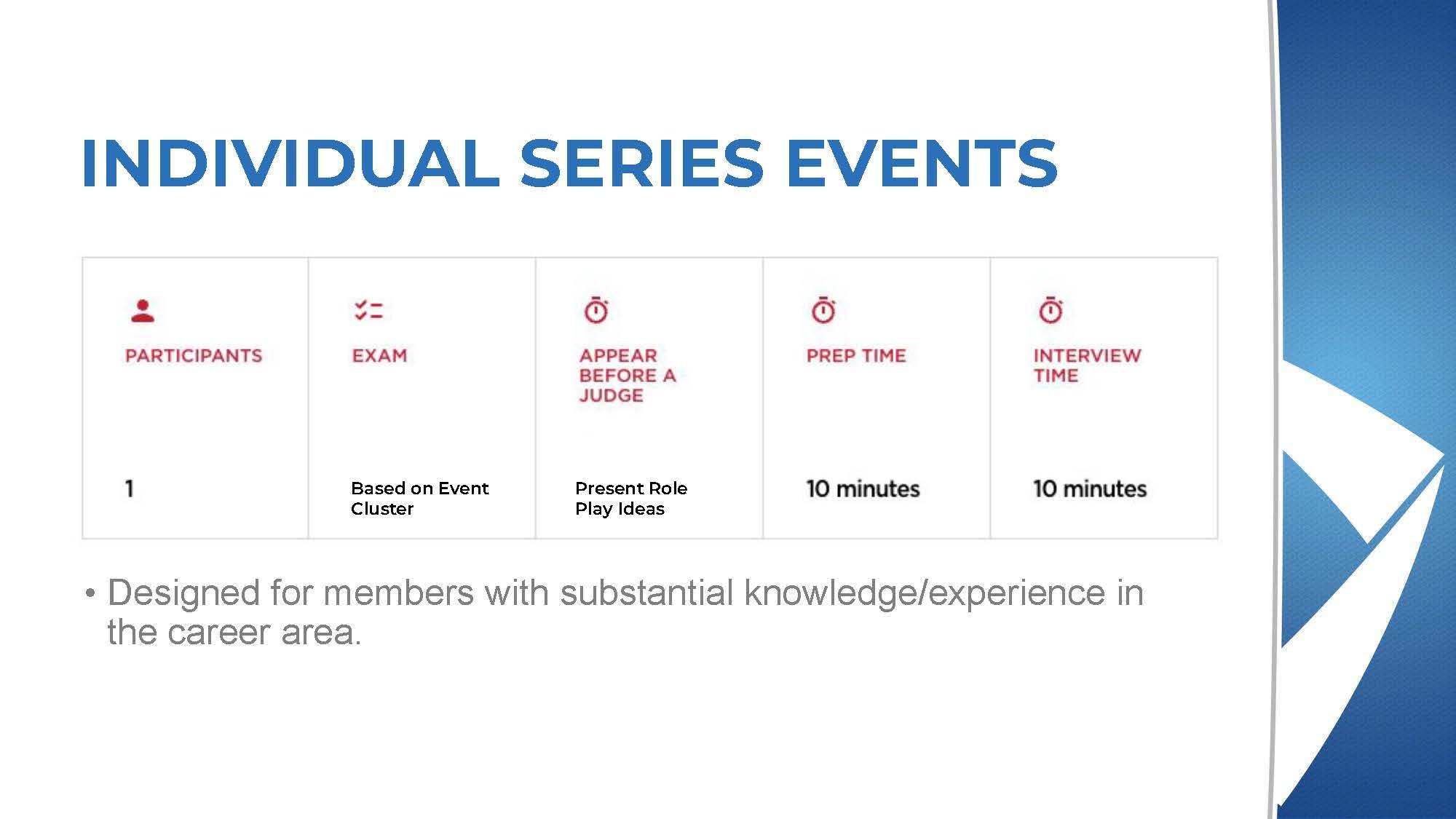
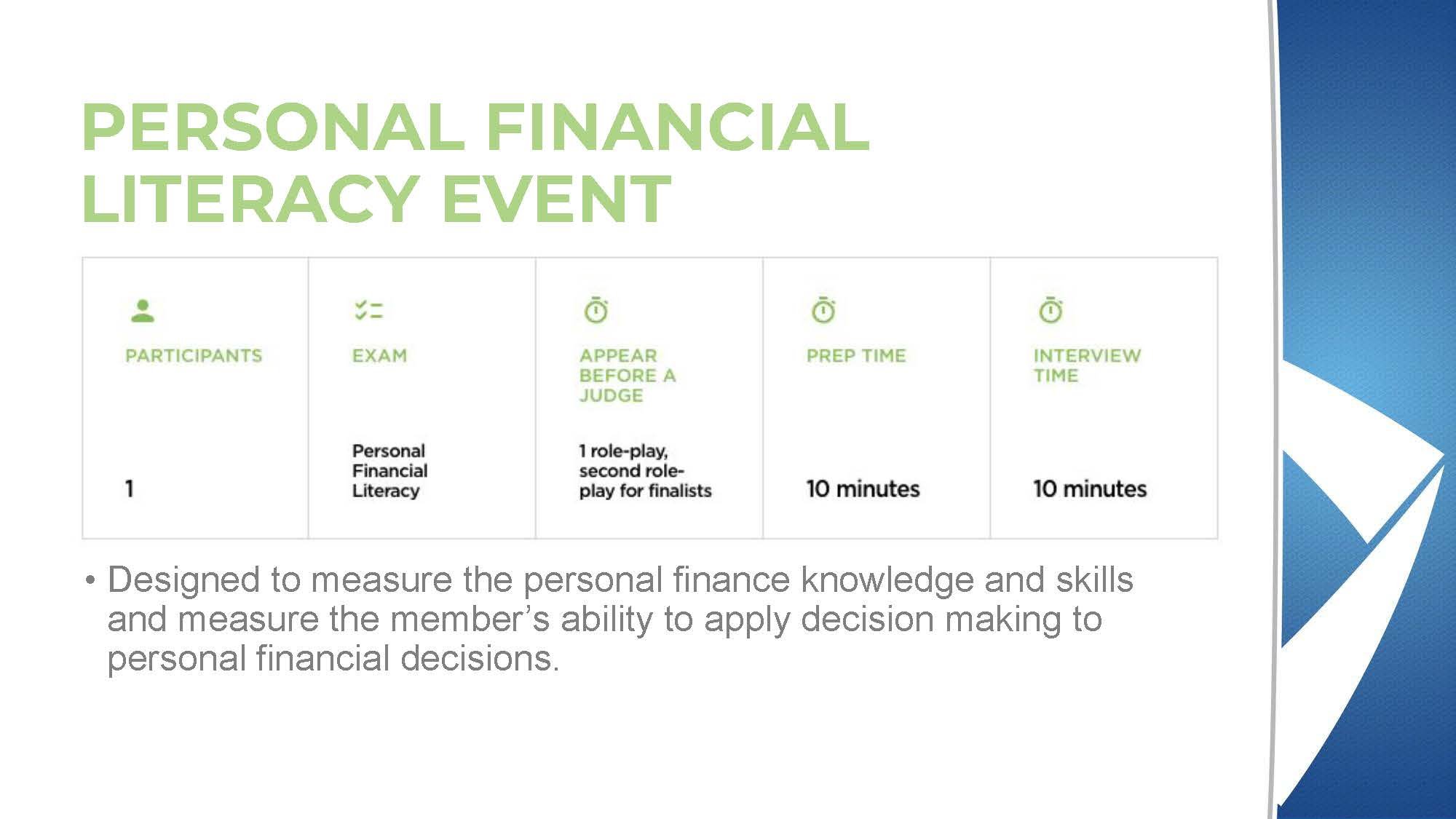
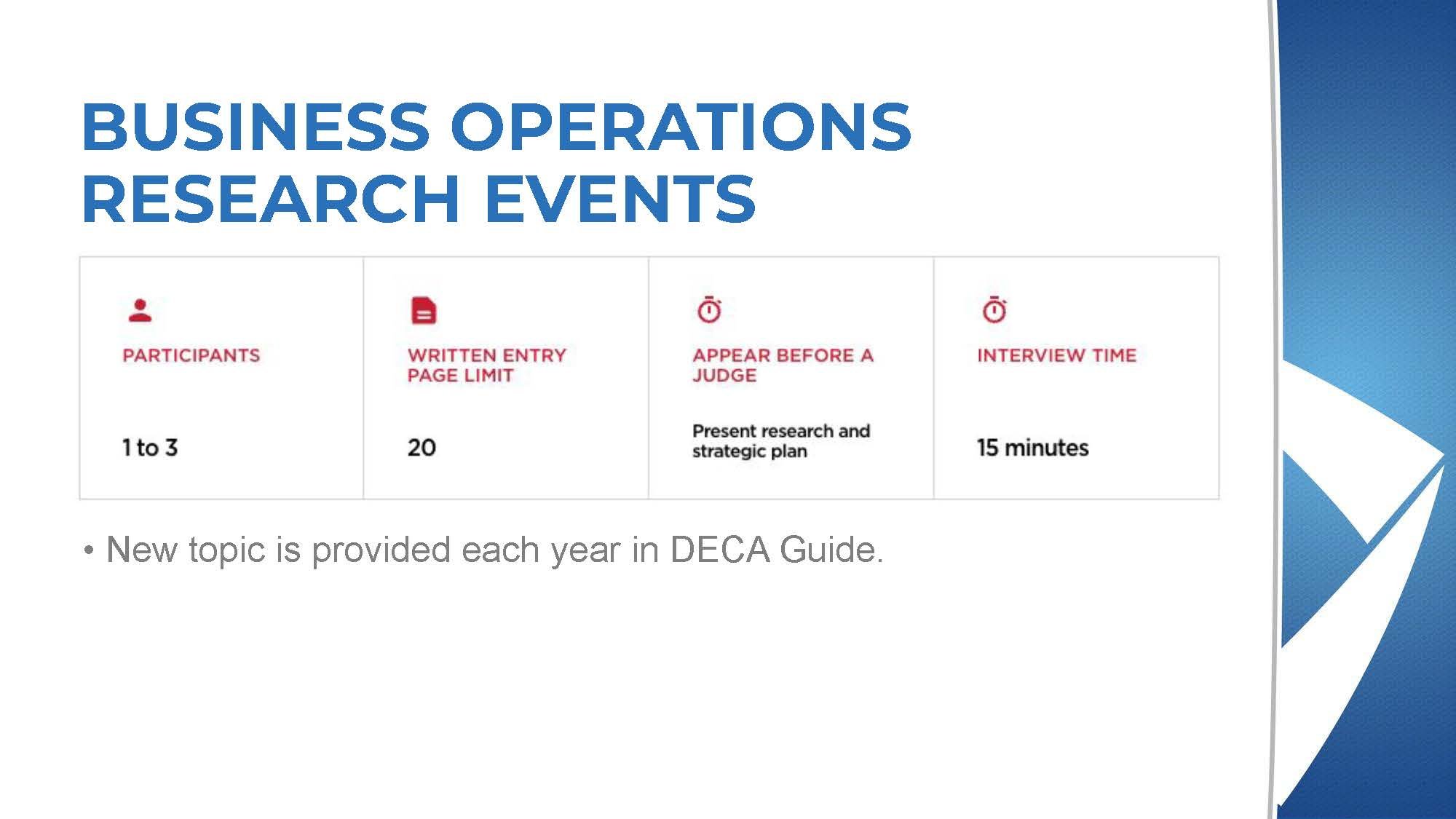
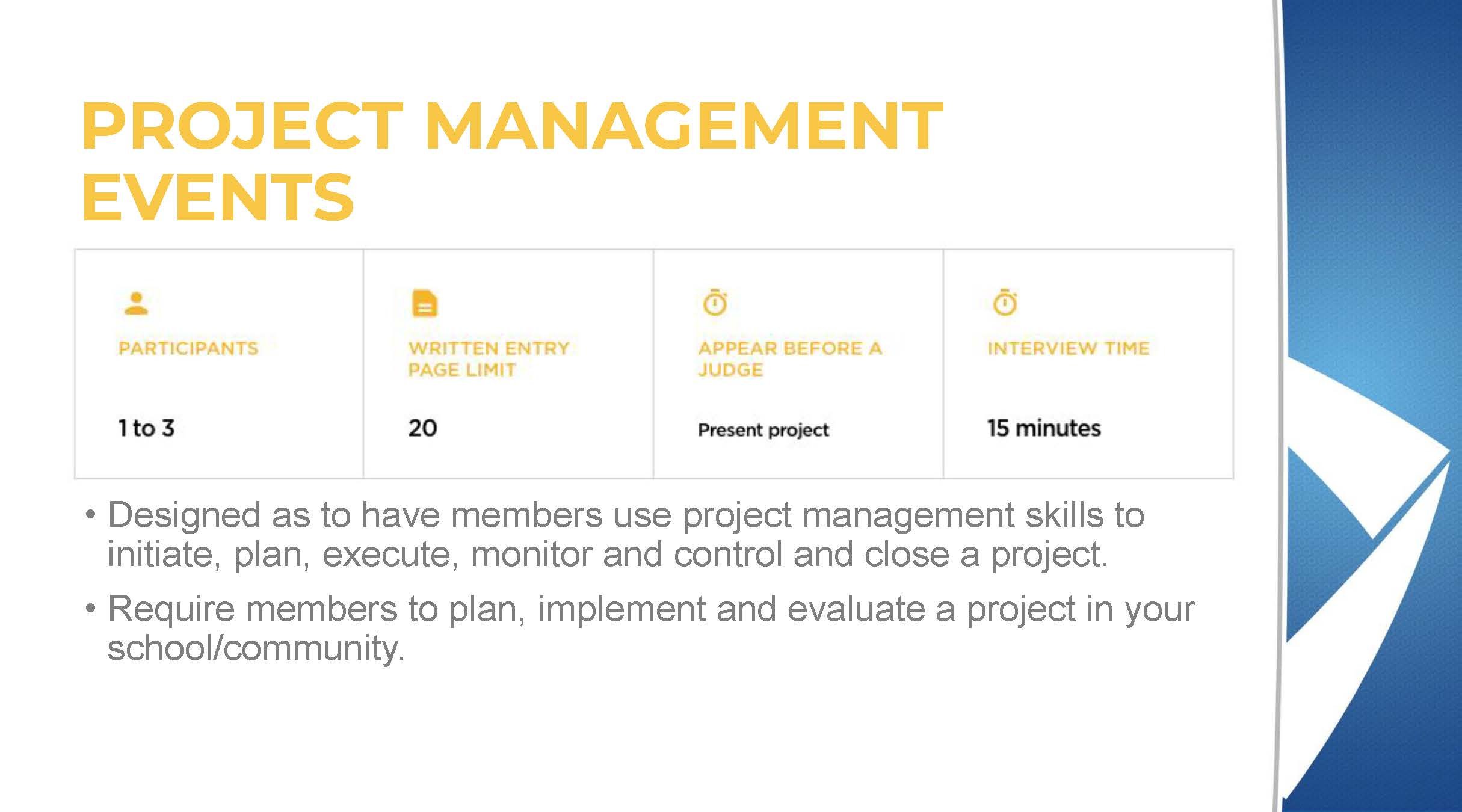
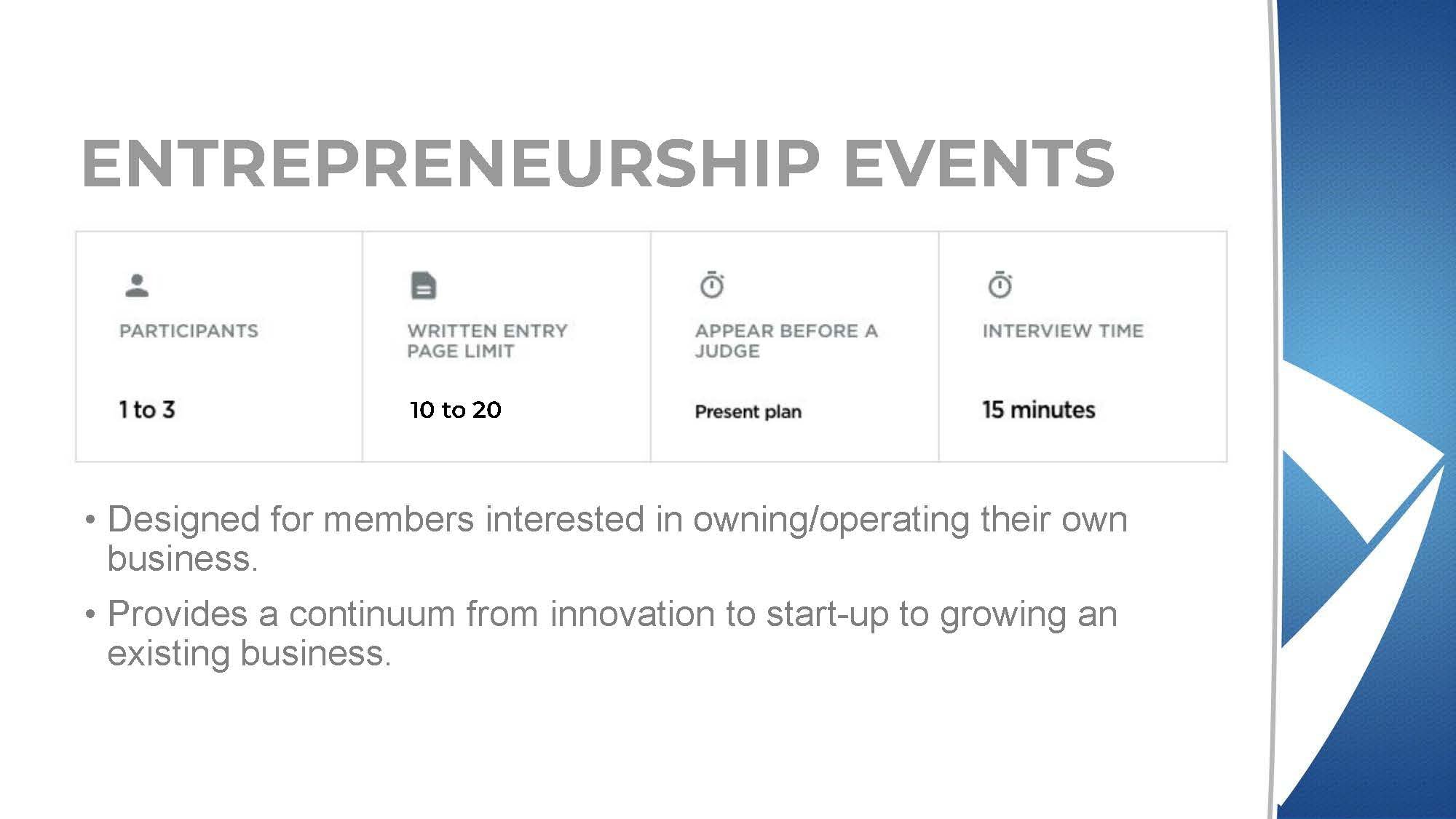
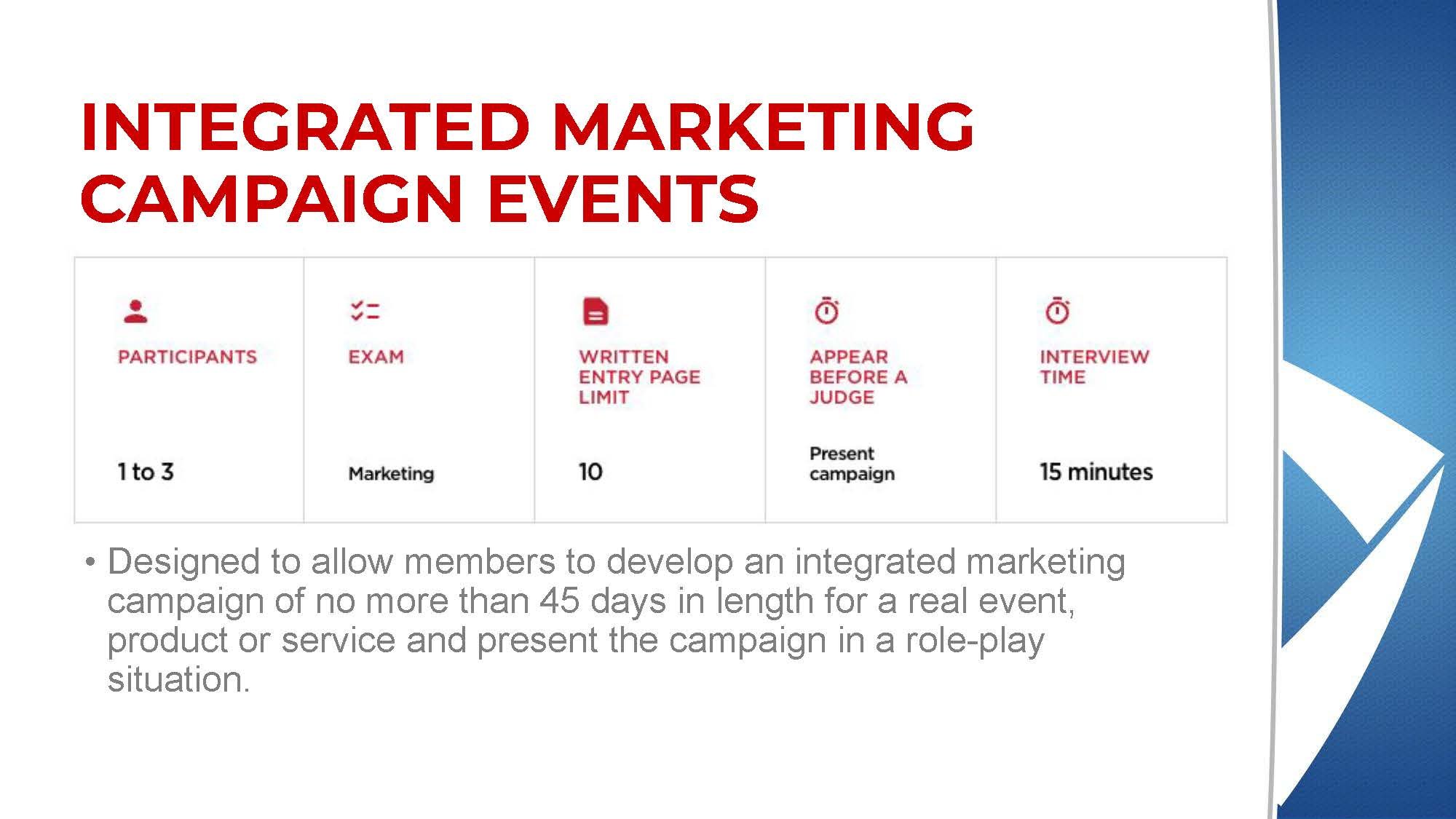
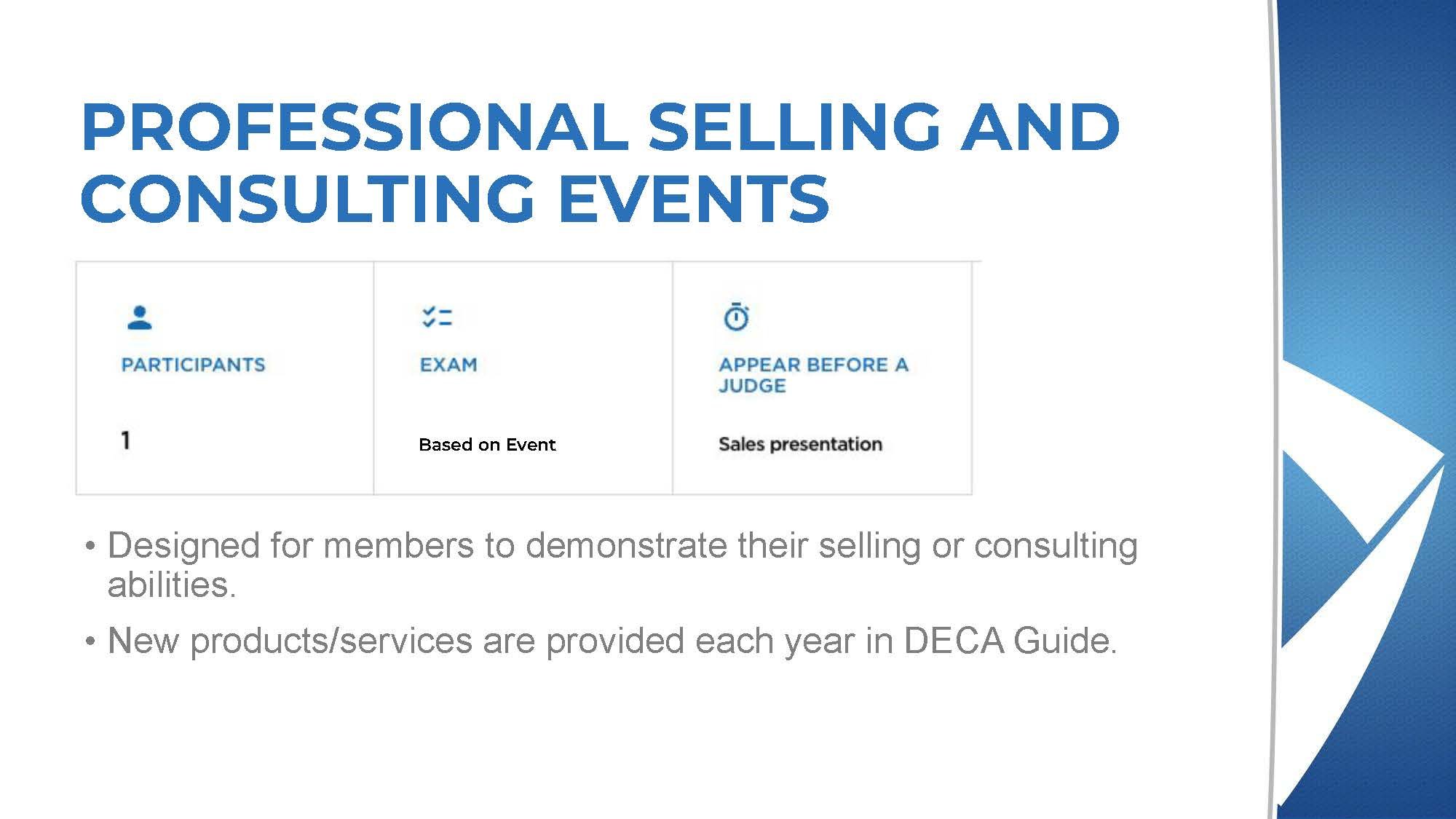
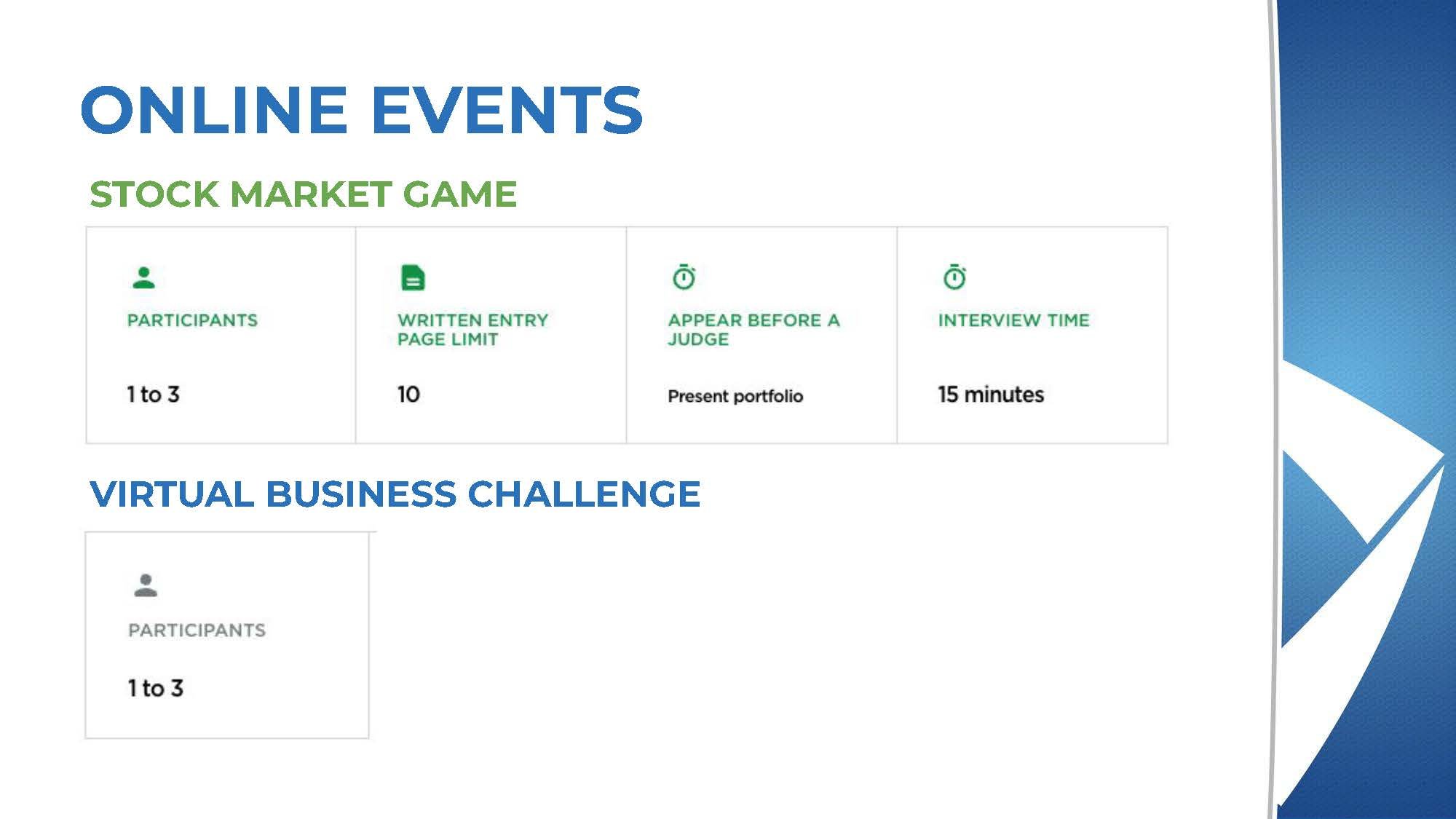
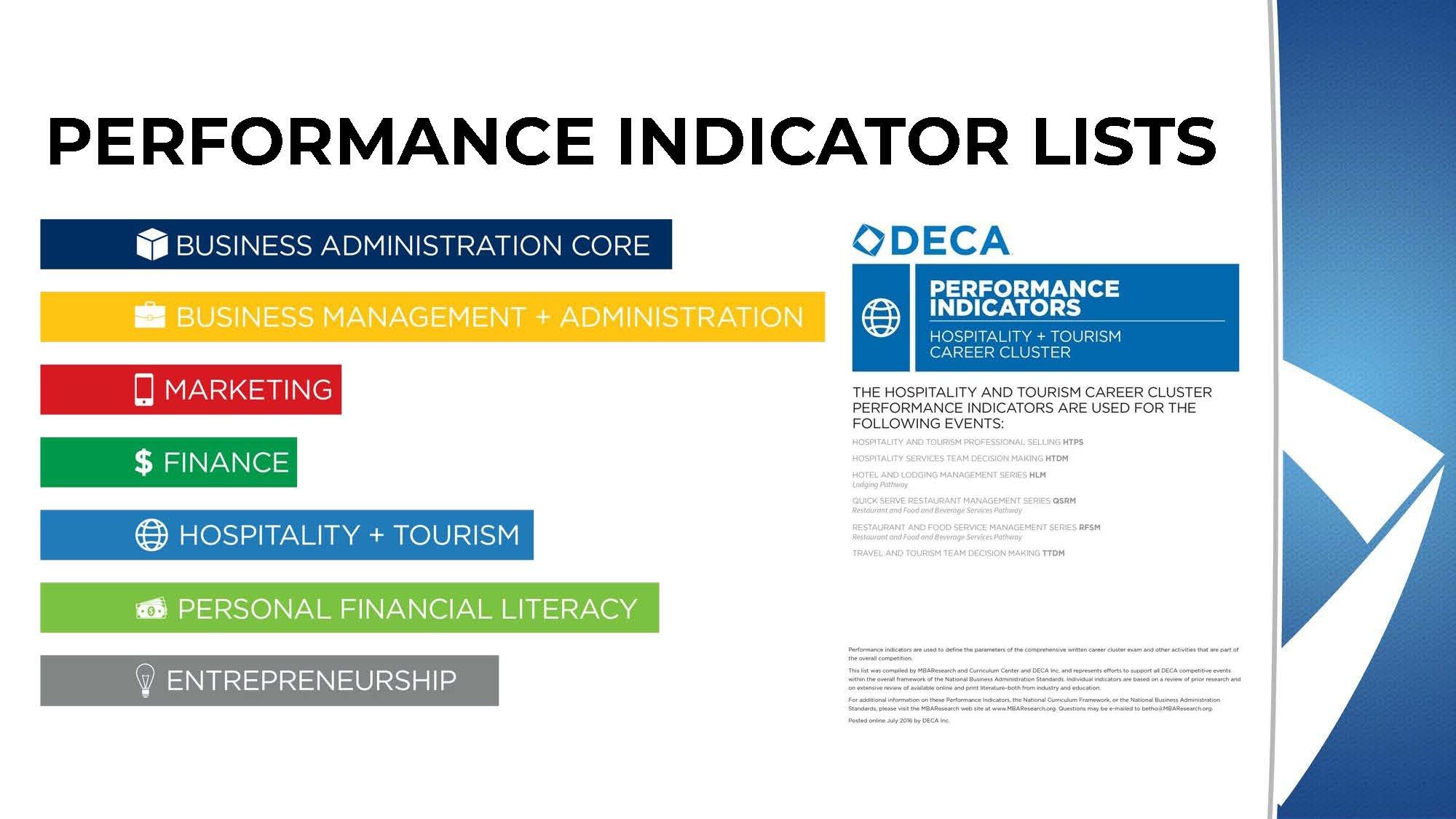
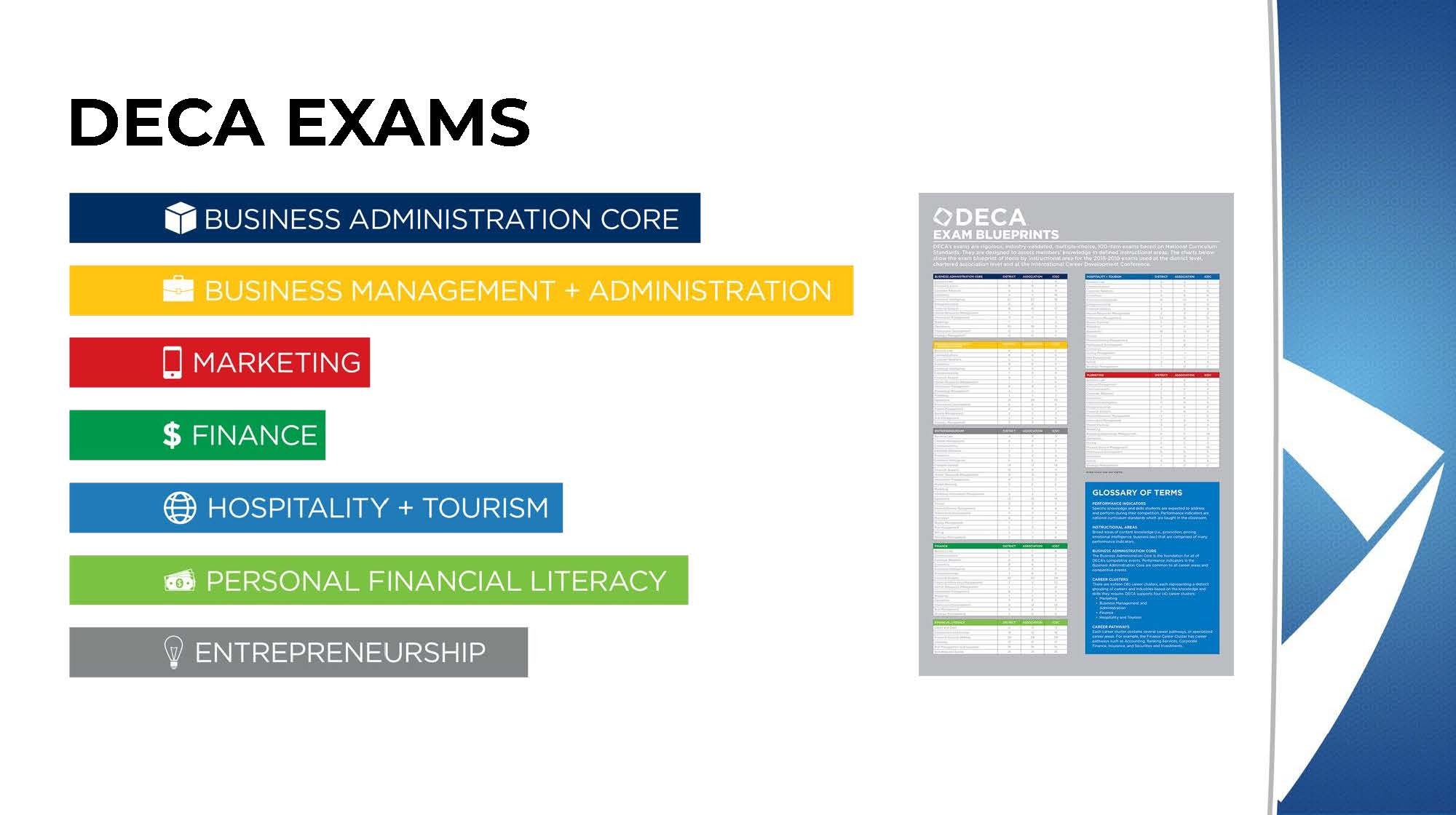
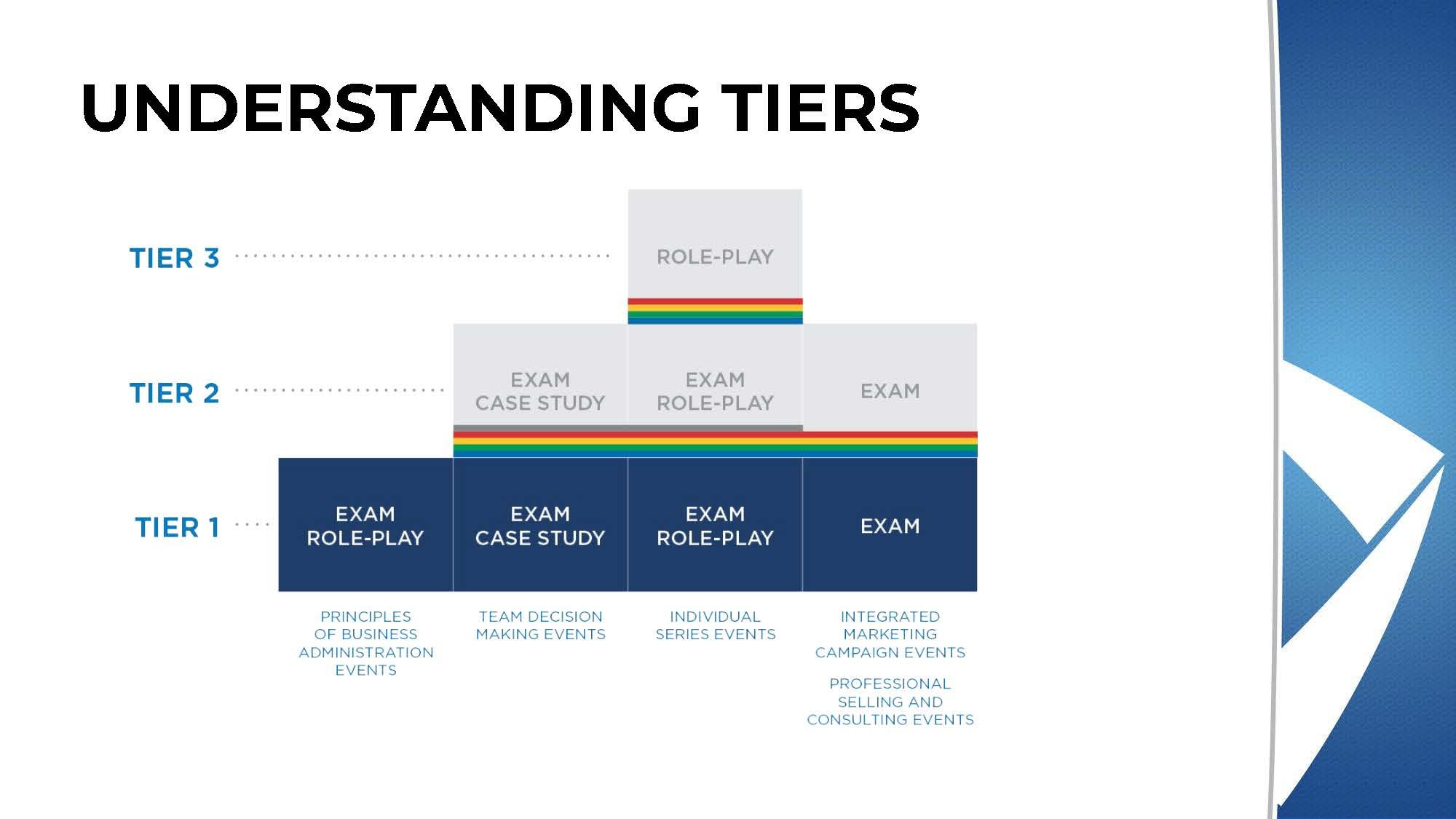
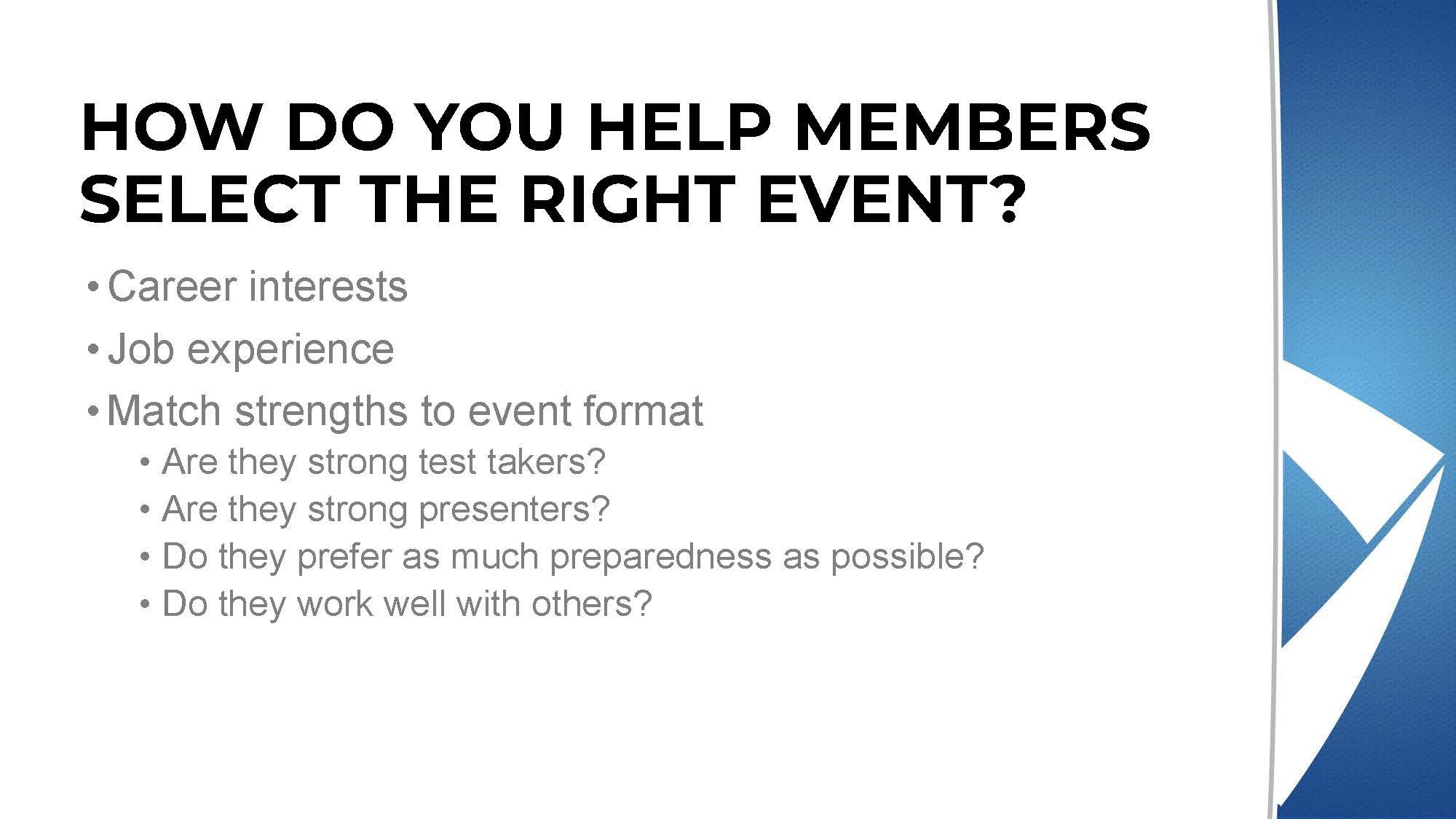
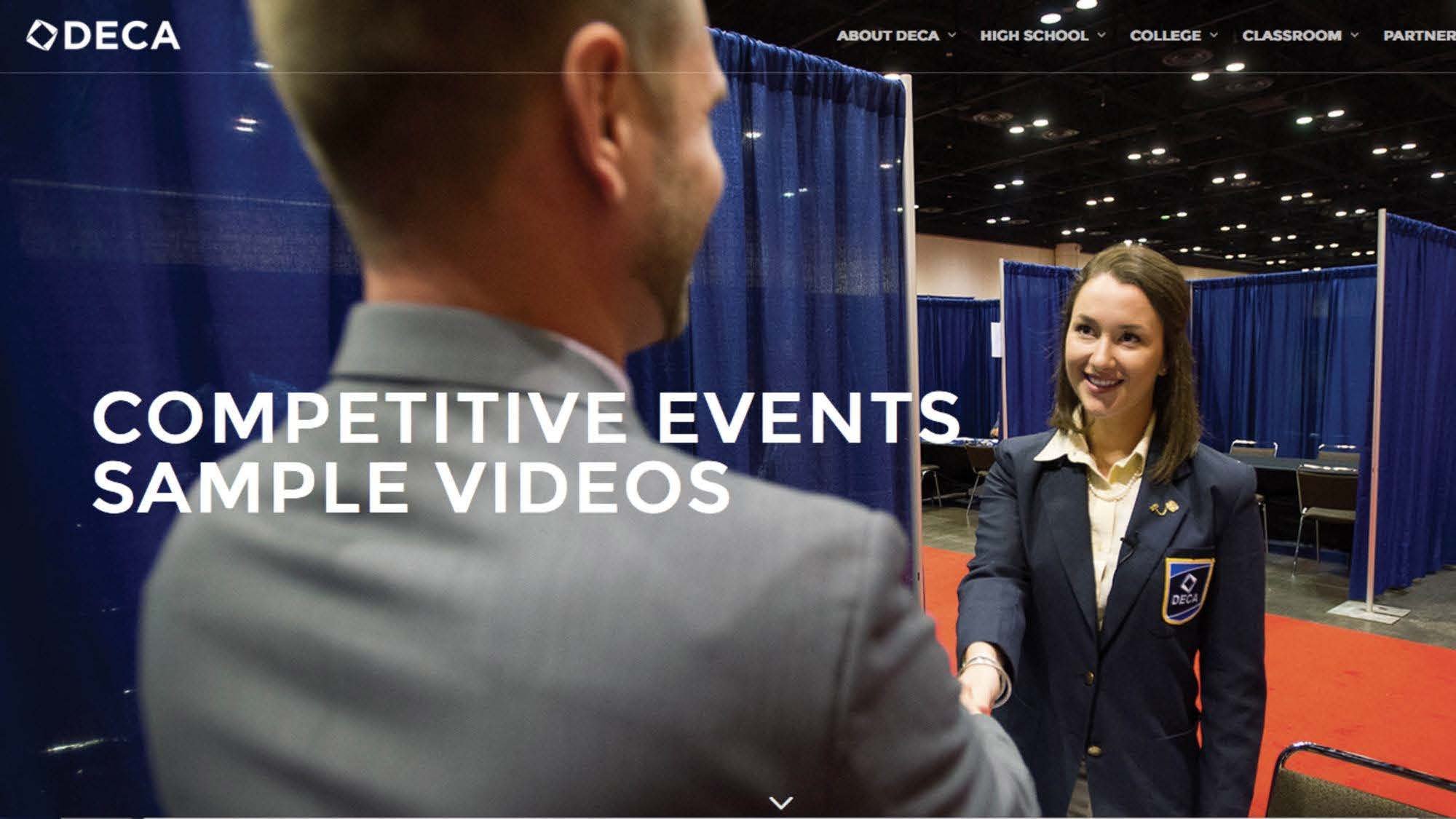

*The Google Slides and PowerPoint versions each have presentation notes in the notes section of each slide*
INTRO CHAPTER MEETING
PREVIEW
What does this presentation include?







INTRO TO DECA
PREVIEW
What does this presentation include?
















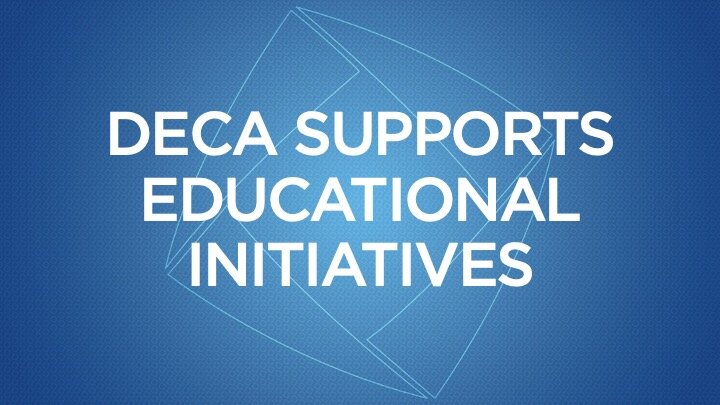

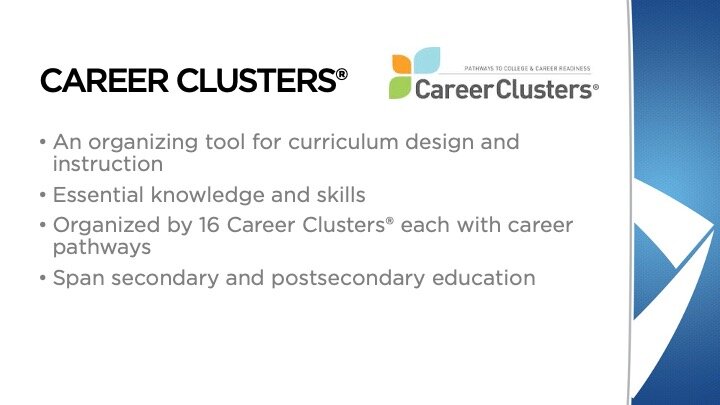
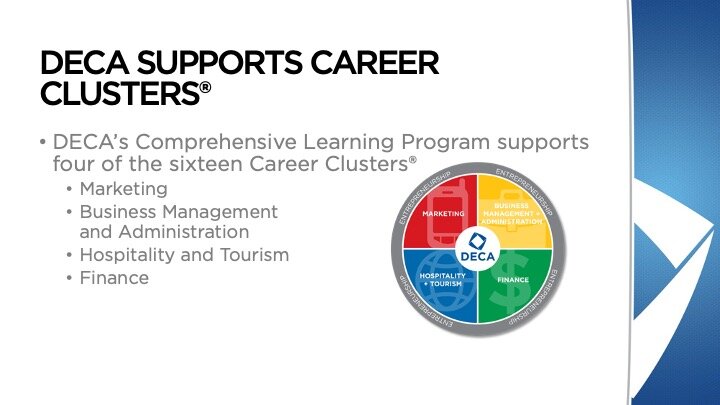
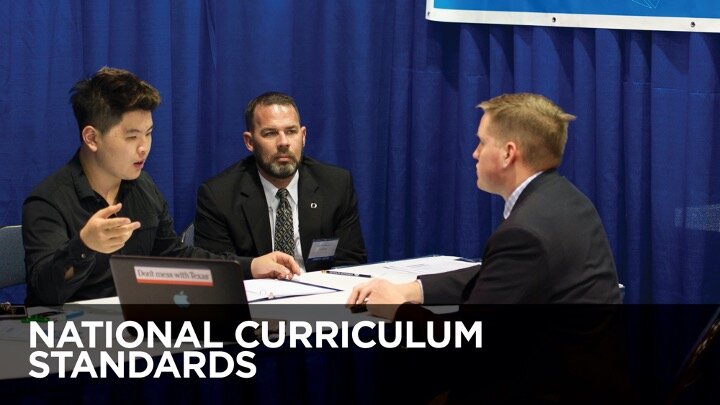
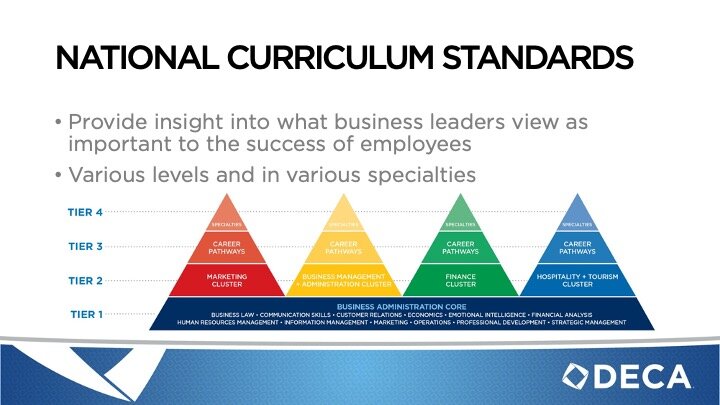
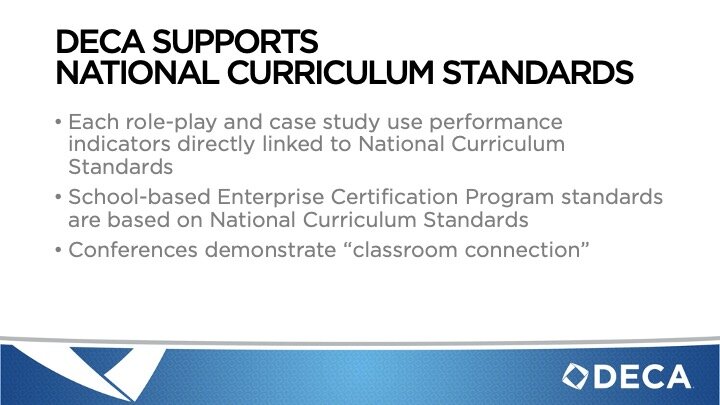
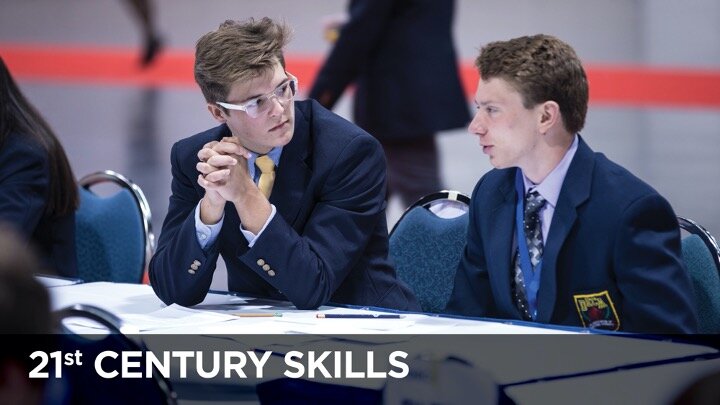
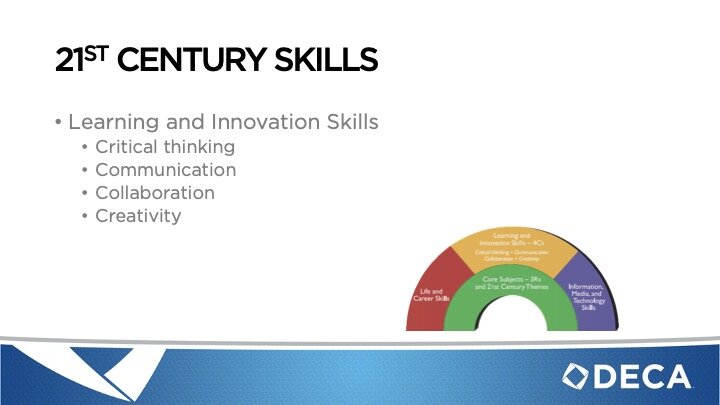
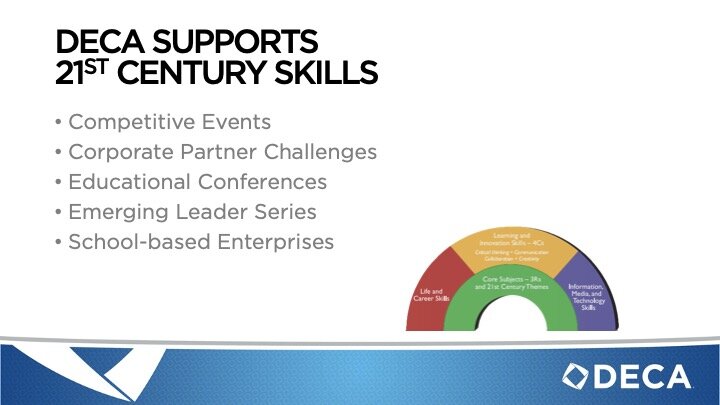

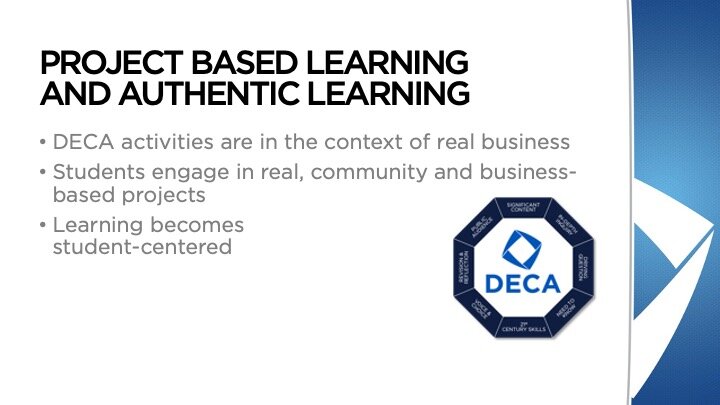

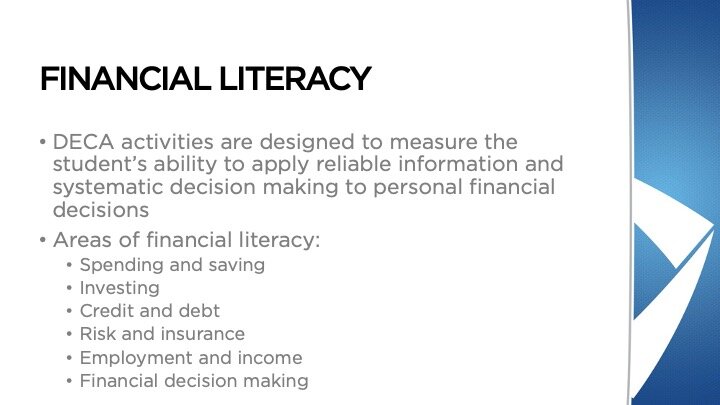
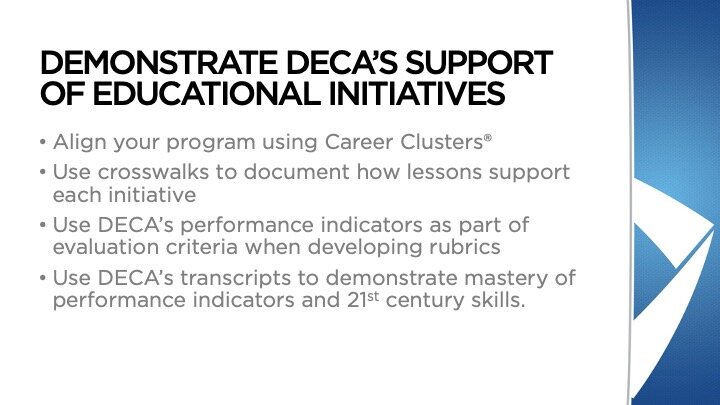

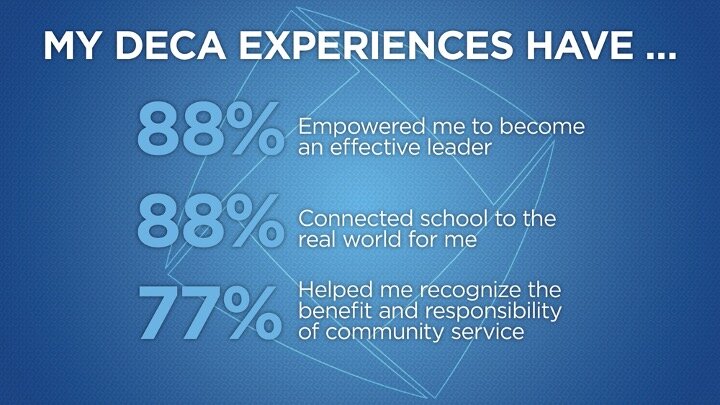
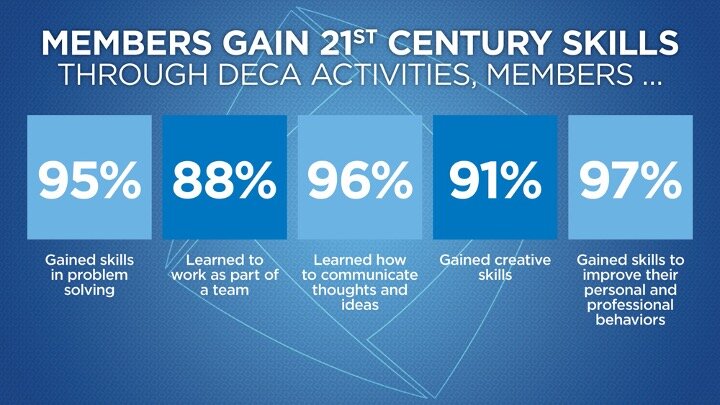
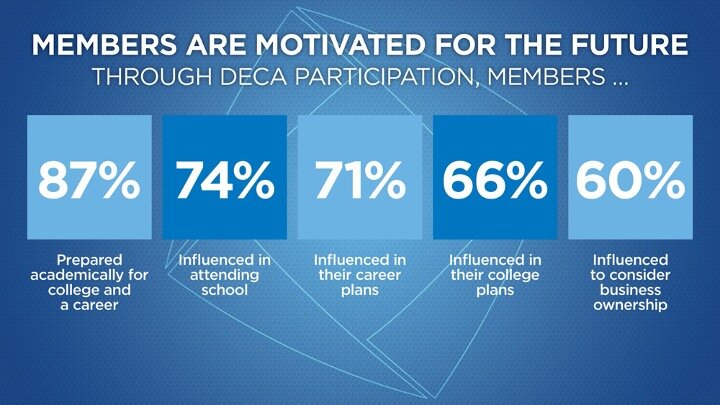


PRE-COMPETITION MEETING
PREVIEW
What does this presentation include?
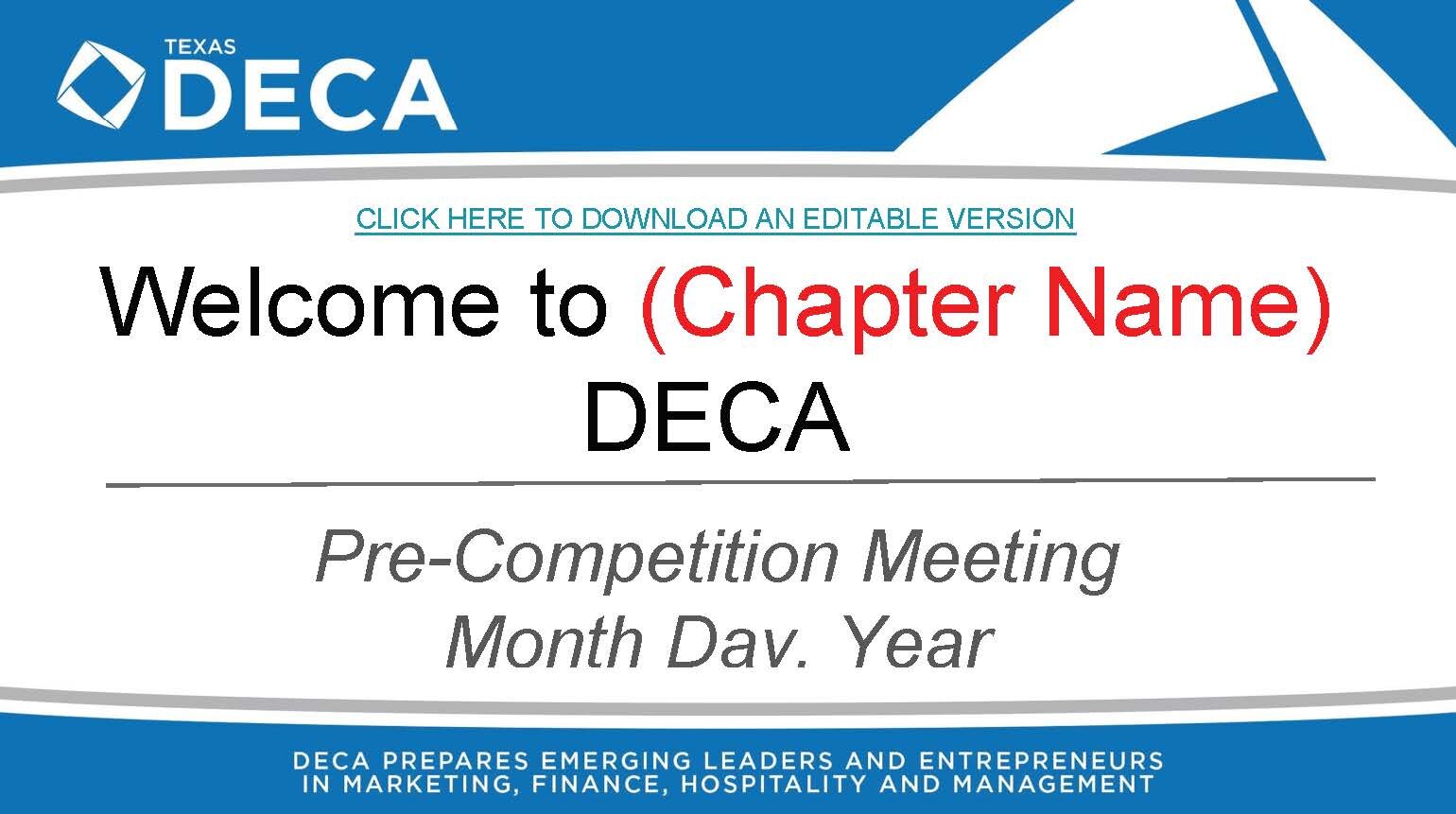
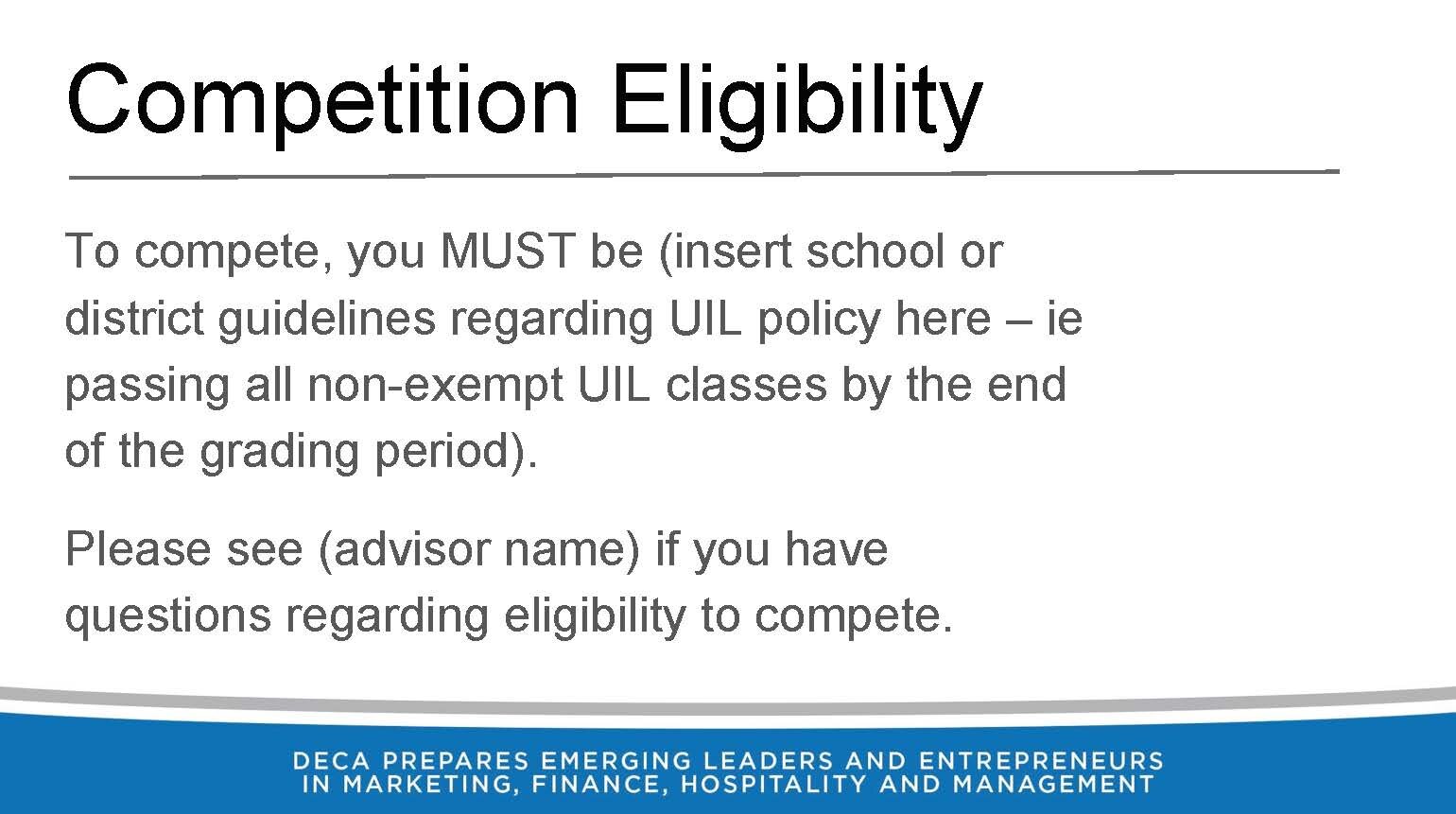
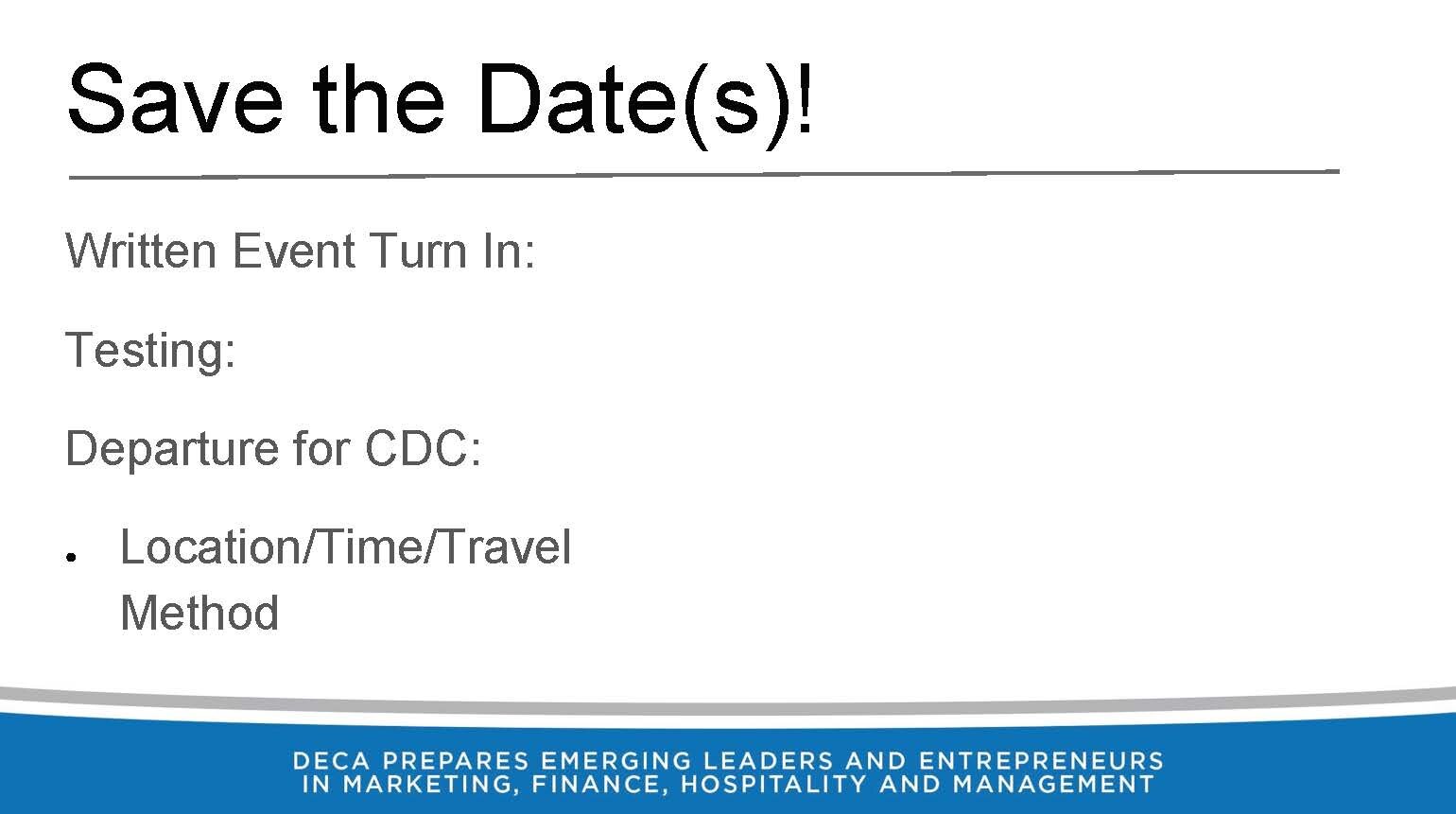
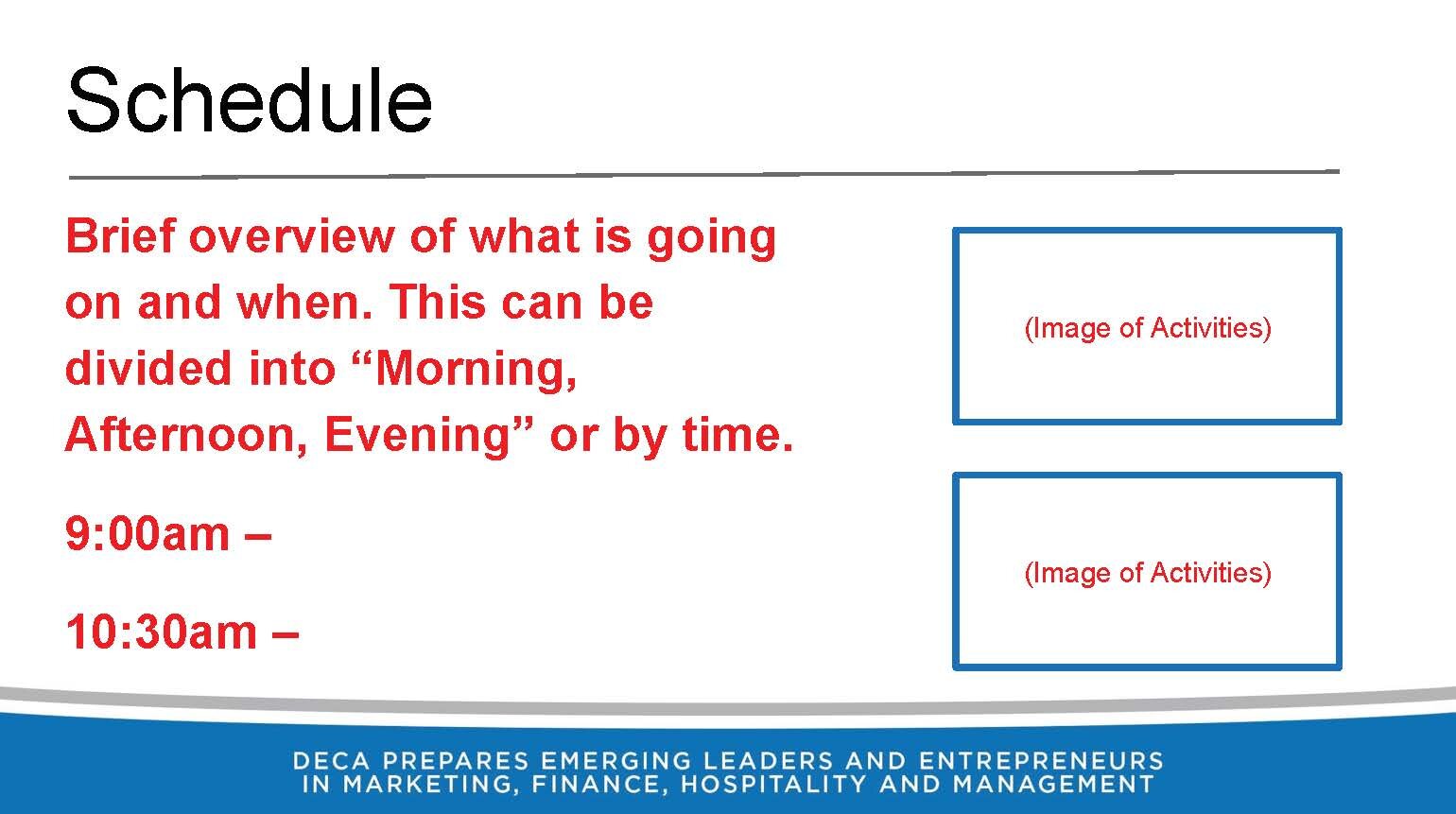
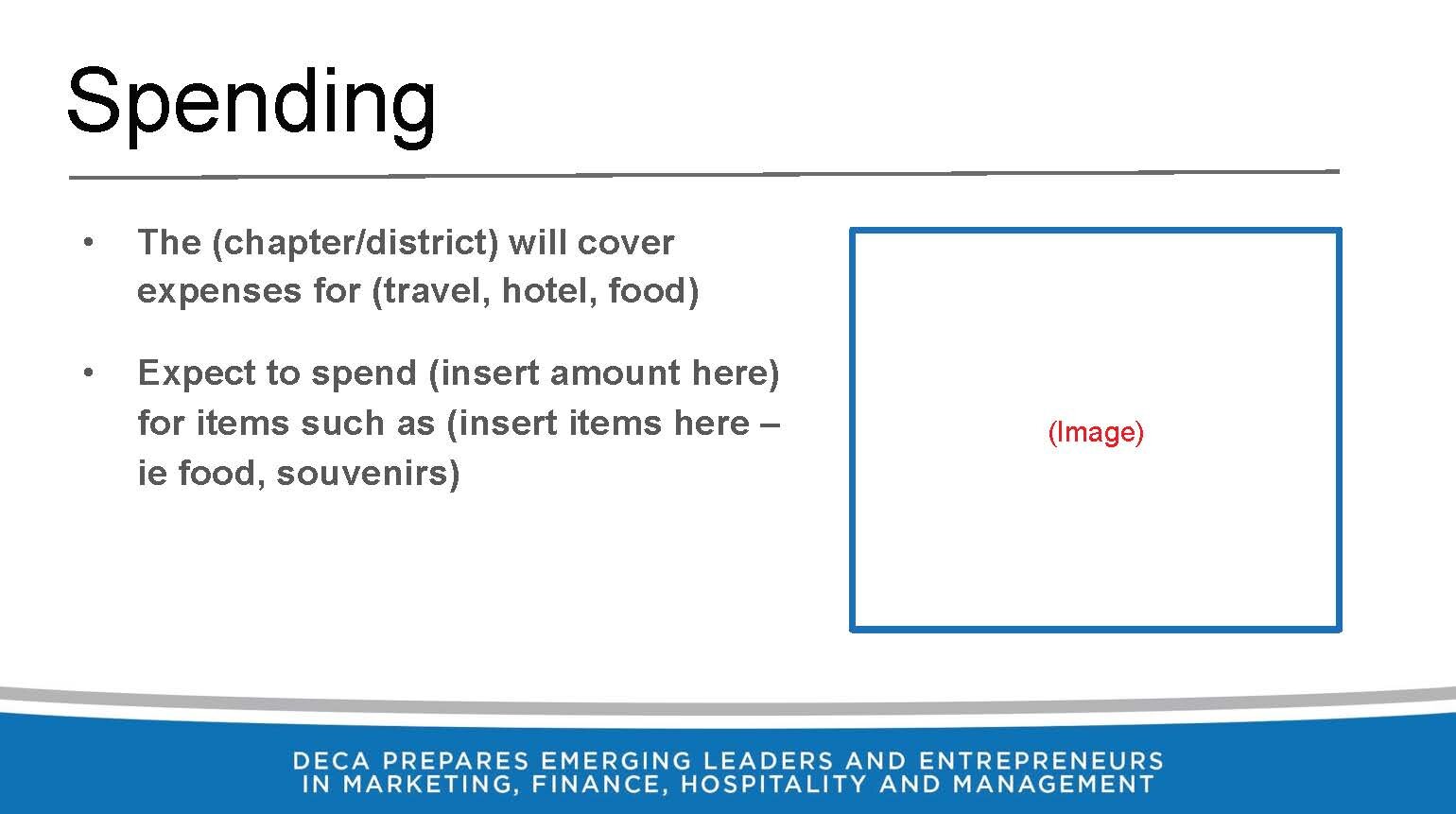
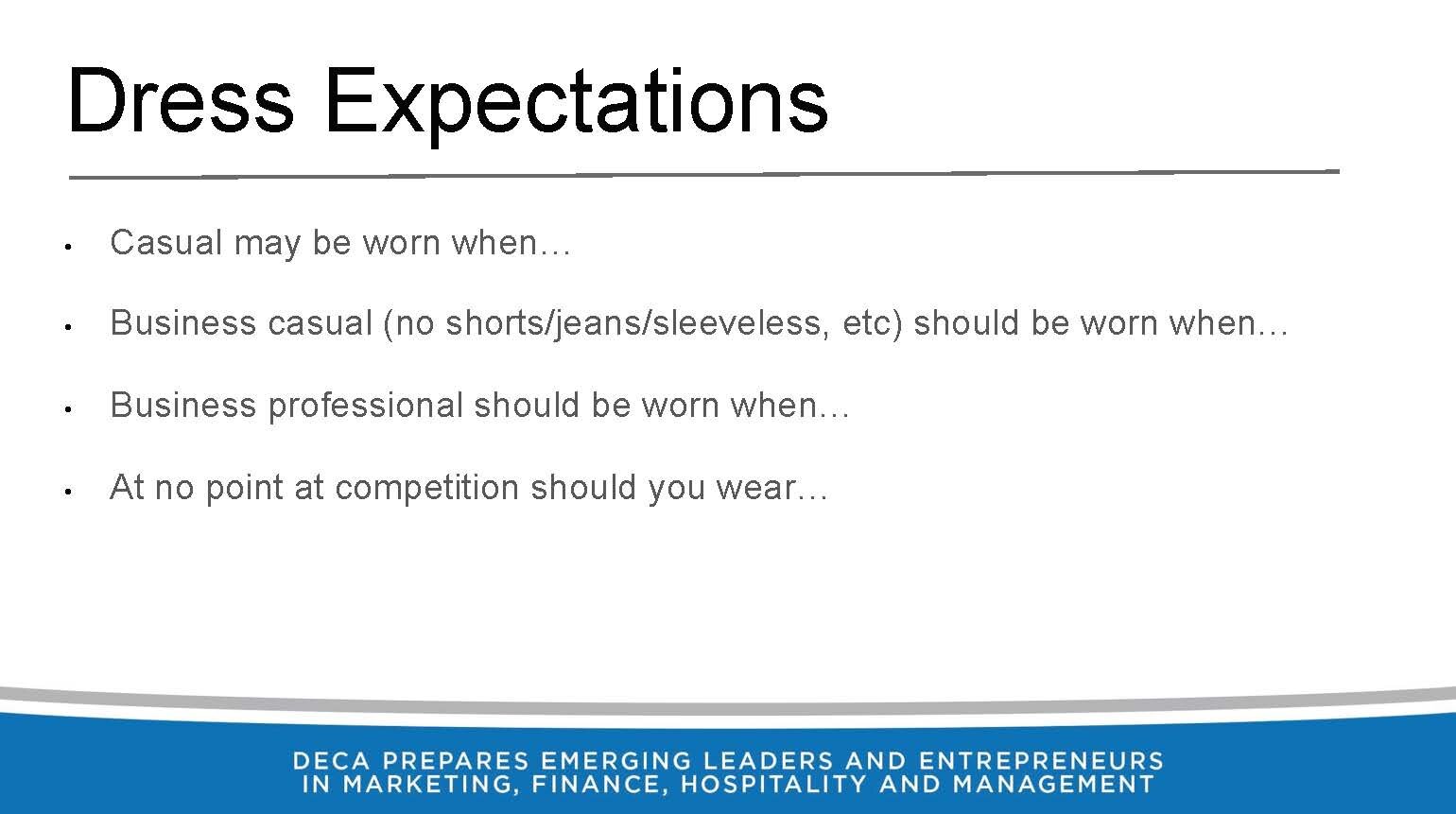
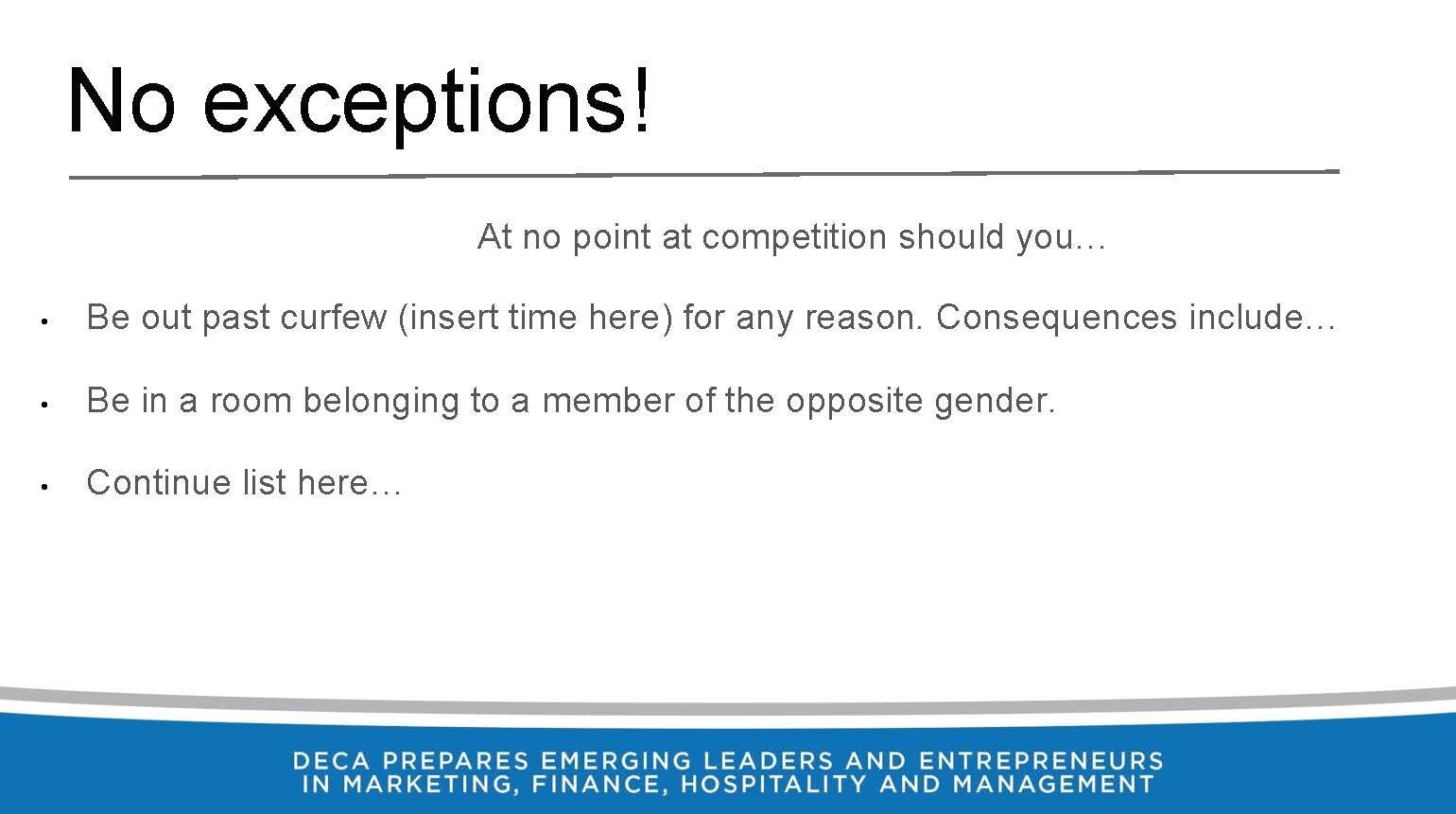
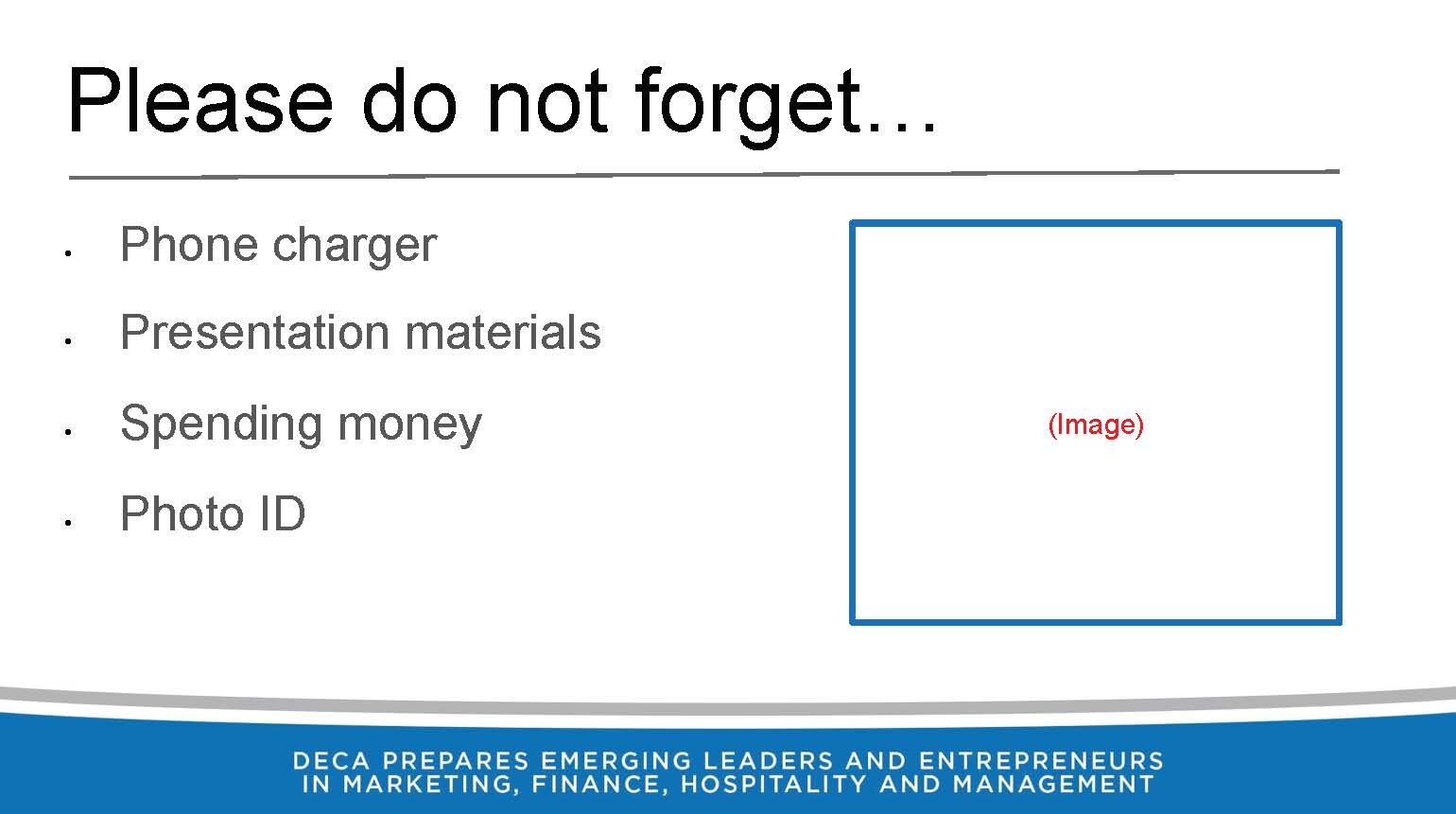
HOW TO HOST A SOCIAL
PREVIEW
What does this presentation include?
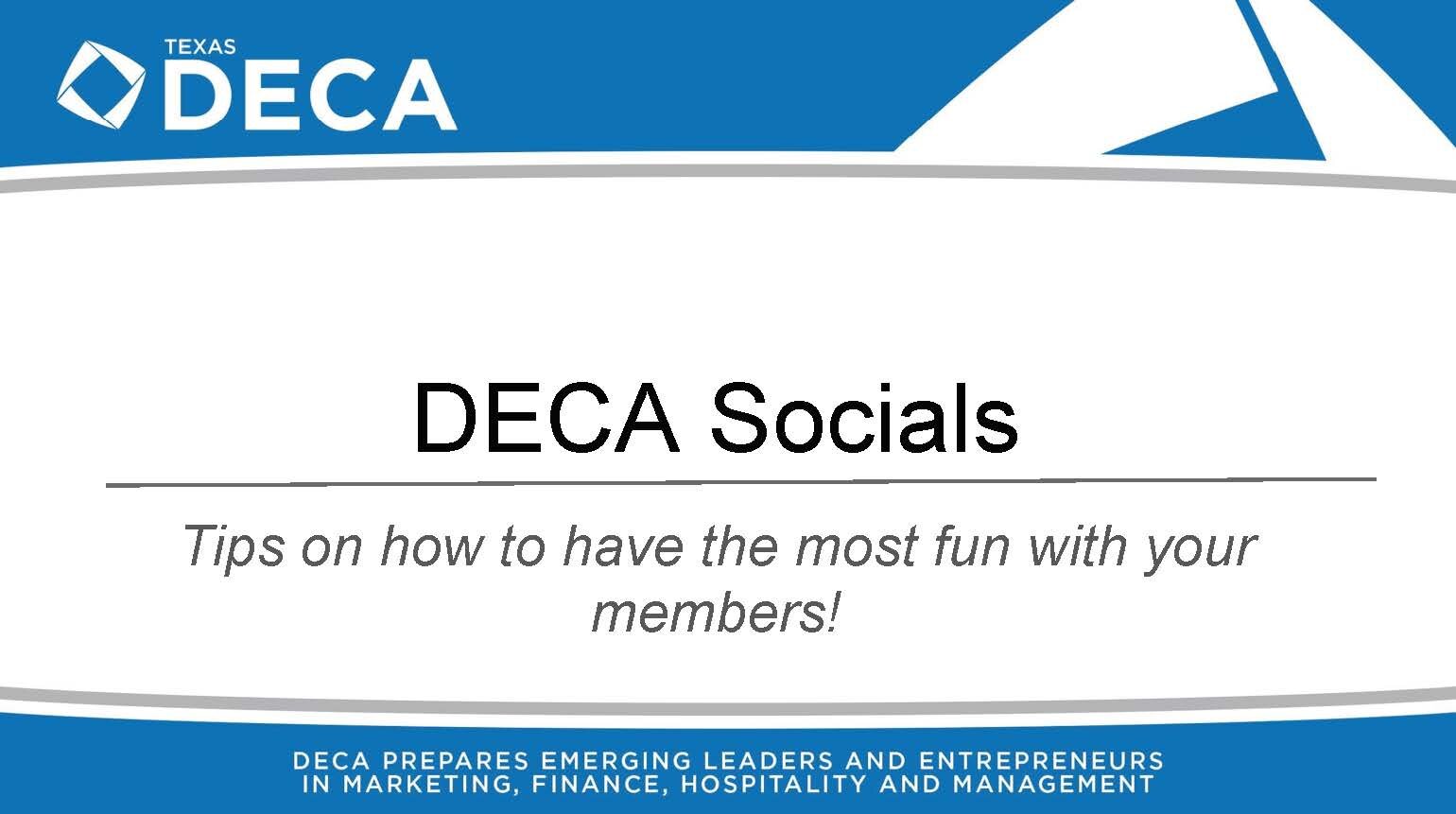
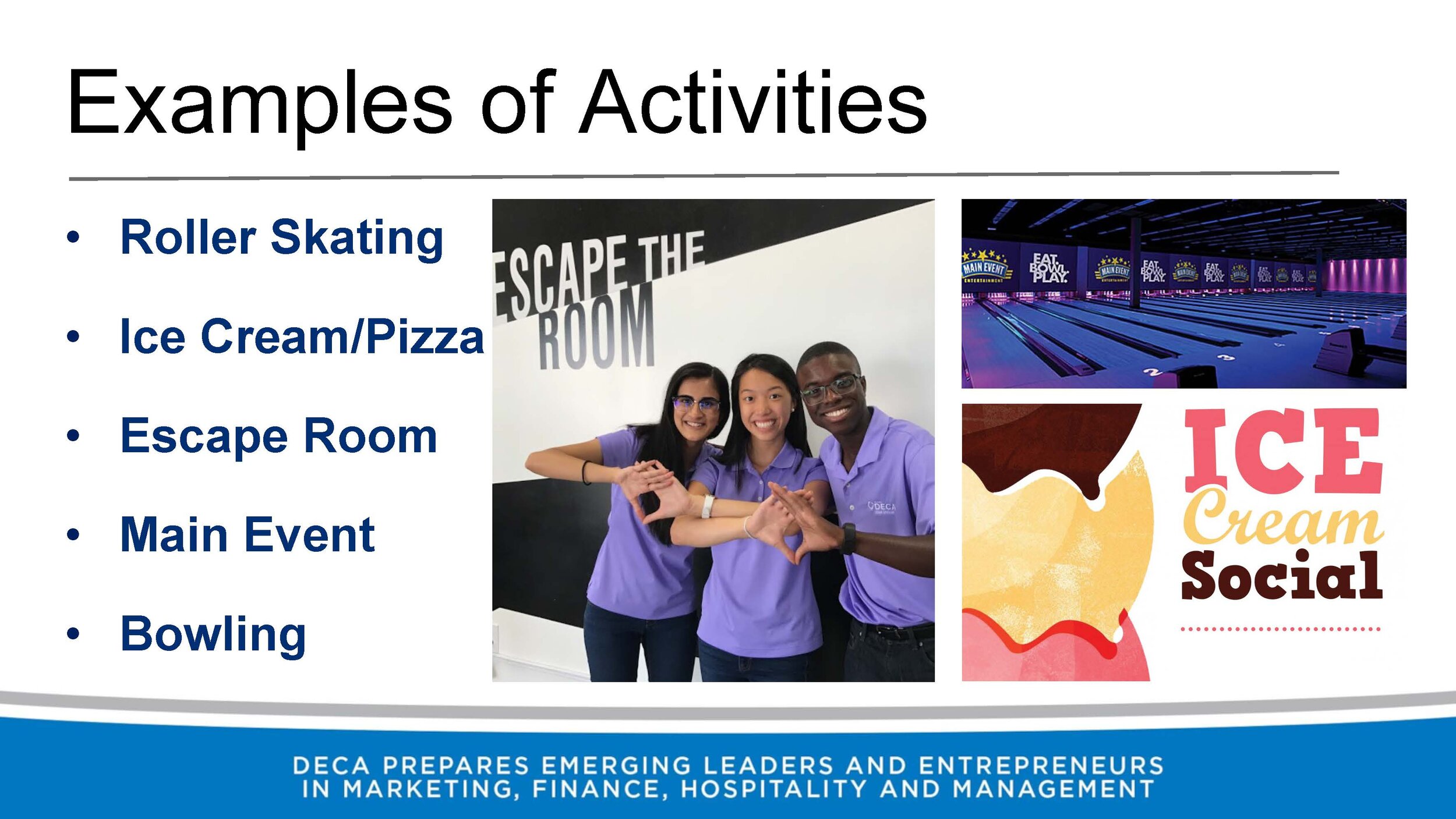
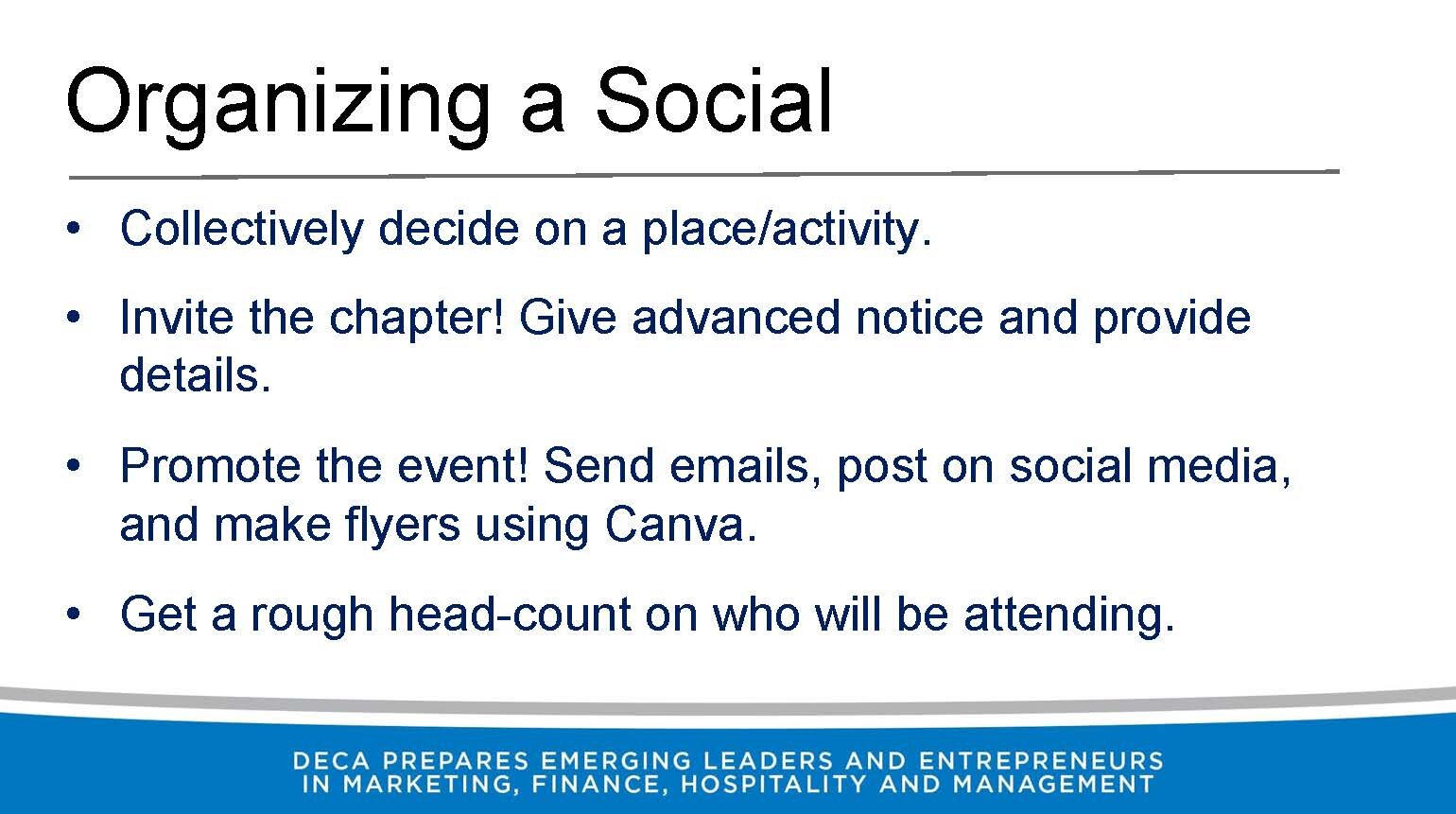
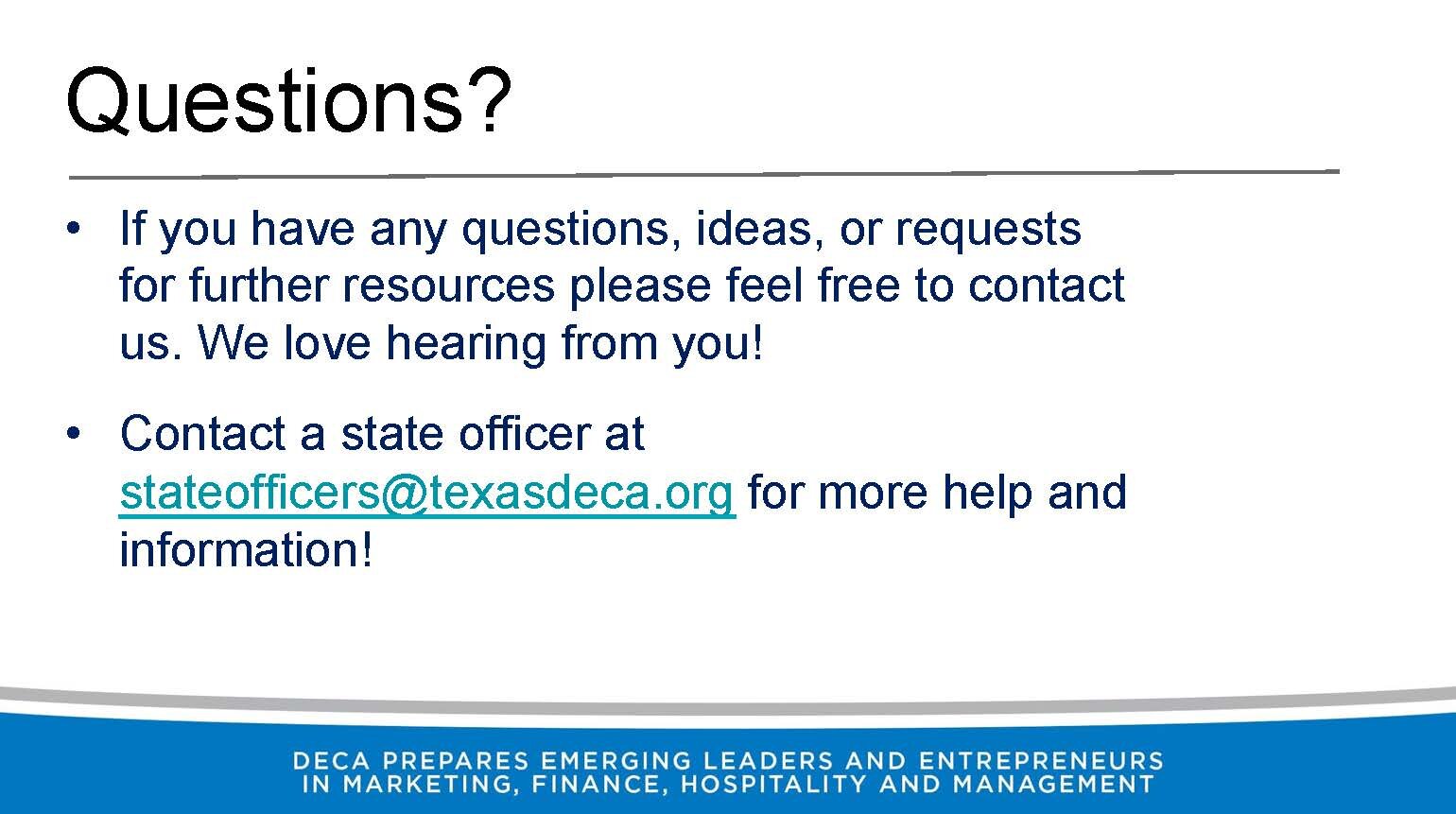
Practice Testing
DECA's Written Event Guidelines - Printout Versions
Related Resources:
Earn a Spot at ICDC
compete in the STOCK MARKET GAME
Participants in the Stock Market Game develop and manage all aspects of an investment portfolio including stock selection, buying and selling. The top 25 teams from each DECA region earn the opportunity to compete at ICDC.
September 9 - December 6 | Learn more here
compete in the virtual business challenge
VBC is a fast-paced, online simulation that challenges participants to operate a web-based business in one of eight areas. There are two qualifying rounds. The top two teams from each region in each round earn the opportunity to compete at ICDC.
Round 1 | October 15-25 | Registration Opens October 3 | Learn More Here
Round 2 | January 14-24
compete in a traditional competitive events
DECA offers 51 traditional competitive events to choose from. From role plays to prepared business plans, there’s something for everyone. For traditional competitive events, members will need to compete at the district level, advance to the state level, and qualify for ICDC at the state level.
check out the competitive events here
earn a gold certification in school-based enterprise
SBE’s earning a gold certification or re-certification have the opportunity to participate in the SBE academy and compete at ICDC. SBE teams can have up to two participants. To get certified, chapters must submit their certification paper by January 14. If you are eligible to attend ICDC, the SBE participants will give a presentation over the SBE.
Learn more here
serve as a voting delegate
Our Texas DECA leadership team take on the responsibility of identifying the next team of executive officers. This includes a combination of incoming/outgoing State and District Officers. Learn more about serving as a Texas DECA leader here.
complete chapter campaigns & earn thrive level
Meet the requirements of any two DECA Month Chapter Campaigns (promotional, ethical leadership, community service) or two categories of the National Membership Campaign and earn two allocations to attend the Thrive Academy at ICDC.
Learn more here.
complete the texas two-step campaign
Complete either a social OR community event with another chapter and earn the opportunity to apply for one academy spot. Complete both events and earn the opportunity to apply for two academy spots.
Learn more here.
participate in the case study challenge
Place in the top three in one of the case study challenges offered by Texas DECA and earn your chapter the opportunity to send members to an academy at ICDC.
Learn more here.
WHAT LEADERSHIP ACADEMIES DOES DECA OFFER?
THRIVE ACADEMY
ULTIMATE CHAPTER
Now it’s time to thrive with other high-performing chapters and continue to develop your toolbox of collaboration, communications, critical thinking, and creativity skills. Eligibility to attend Thrive is based on achievement in DECA’s Chapter Campaigns.
ignite academy
ultimate member
Ignite your spark for DECA! As an emerging leader, you have great potential to take advantage of all that DECA offers. Now’s your time to gain an edge as you learn how you can take your personal DECA experience to the next level and ignite your passion for DECA.
aspire academy
ultimate graduate
As you soon graduate, the sky is the limit for your aspirations. Do you know what to expect in college or how to be successful in your career? learn how to leverage your DECA experience to your advantage in college, interviews, and internships. Aspire to get on the fast track to college and career success.
elevate academy
ultimate chapter leader
Elevate your leadership in DECA by becoming the ultimate DECA chapter leader. Discover your personal leadership style and how you can use that to take your chapter to the next level. Now’s your time to elevate your DECA status from member to chapter leader.
Related Resources:
Competitive Event Allocations
all chapters will get up to 3 allocations per event. additional allocations will be scaled based on chapter size.
The allocation scale can be seen at the bottom of the page. Competitive event allocations are based on the HIGHER total number between the previous year’s final membership and the initial roster submitted by October 15th of the current membership year. See the chart linked below for your allocation based your previous year’s membership. Allocation numbers may increase based on membership numbers as of October 15.
Each individual in principles, personal financial literacy, individual series, or professional selling events counts as ONE allocation. Each two person team for team decision making events counts as ONE allocation. Each team of one to three people for the integrated marketing, operations research, entrepreneurship, or project management events counts as ONE allocation.
Allocations will be scaled based on the higher total number between the previous year’s final membership and the initial roster submitted by October 15th of the current membership year.
10-99 Members: up to 3 per event
100-149 members: up to 4 per event
150-199 members: up to 5 per event
200-249 members: up to 6 per event
250-299 members: up to 7 per event
300-349 members: up to 8 per event
350-399 members: up to 9 per event
400+ members: up to 10 per event
Principles of Business Administration Events (must be the first year on a DECA Roster)
PBM Principles of Business Management and Administration
PEN Principles of Entrepreneurship
PFN Principles of Finance
PHT Principles of Hospitality and Tourism
PMK Principles of Marketing
Financial Literacy Event
PFL Personal Financial Literacy
Individual Series Events
ACT Accounting Applications Series
AAM Apparel & Accessories Marketing Series
ASM Automotive Services Marketing Series
BFS Business Finance Series
BSM Business Services Marketing Series
ENT Entrepreneurship Series
FMS Food Marketing Series
HLM Hotel and Lodging Management Series
HRM Human Resources Management Series
MCS Marketing Communications Series
QSRM Quick Serve Restaurant Management Series
RFSM Restaurant and Food Service Management Series
RMS Retail Merchandising Series
SEM Sport and Entertainment Marketing Series
Team Decision Making Events
BLTDM Business Law and Ethics Team Decision Making Event
BTDM Buying and Merchandising Team Decision Making Event
ETDM Entrepreneurship Team Decision Making Event
FTDM Financial Services Team Decision Making Event
HTDM Hospitality Services Team Decision Making Event
MTDM Marketing Management Team Decision Making Event
STDM Sports & Entertainment Marketing Team Decision Making Event
TTDM Travel & Tourism Team Decision Making Event
Integrated Marketing Campaign
IMCE Integrated Marketing Campaign - Event
IMCP Integrated Marketing Campaign - Product
IMCS Integrated Marketing Campaign - Service
Professional Selling Events
FCE Financial Consulting
HTPS Hospitality and Tourism Professional Selling
PSE Professional Selling Event Personal
Business Operations Research Events
BOR Business Services Operations Research Event
BMOR Buying and Merchandising Operations Research Event
FOR Finance Operations Research Event
HTOR Hospitality and Tourism Operations Research Event
SEOR Sports and Entertainment Marketing Operations Research Event
Entrepreneurship Events
EIP Entrepreneurship Innovation Plan
ESB Entrepreneurship Start-Up Business Plan
EIB Entrepreneurship Independent Business Plan
EFB Entrepreneurship Franchise Business Plan
IBP International Business Plan
EBG Entrepreneurship Business Growth Plan
Project Management Events
PMBS Business Solutions Project
PMCD Career Development Project
PMCA Community Awareness Project
PMCG Community Giving Project
PMFL Financial Literacy Project
PMSP Sales Project
Related Resources:
Guidebook for Chapter Campaigns
Related Resources:
Statewide Community Service Campaign
Related Resources:
How to Prepare for District CDC
I’m pretty sure we can all agree on one thing here- preparation is a MUST at competition. Although it may be true that we all prepare in different ways, there are a few preparation tips that we all can practice. Let’s go through the top three together.
Tip #1: Get PLENTY of Rest.
I know, this is probably the most cliche of all competition tips. But here’s the thing about cliches- they’re usually ALWAYS on point. Sleep can go a long way, so make sure you’re asleep for at least eight hours the night before competition. Some people are under the false impression that cramming the night before competition helps, when in reality, this will only overwhelm your brain. Don’t believe me? Let’s take a trip back to science class.
“In the 1970’s researchers proposed the “Levels of Processing” theory. They argued that “deep processing” led to better long-term memory than “shallow processing”. Shallow processed information can be encoded by the brain based on the simple characteristics of the words, rather than the meaning. So the knowledge is only able to be stored in short-term memory stores, where it is only retained for a short period.”
Scientists said it, not me. Okay on a serious note, prepare and study months in advance, so the night before competition you can treat yourself to some beauty sleep. I promise, the next morning you will feel as confident as ever!
Tip #2: Make Flashcards
This can work for both written and role plays! For role plays, making flash cards on key vocabulary terms will definitely help you in terms of presentation and allowing yourself to stand out among other competitors. On the other hand, for written, it would be in your best favor to NOT memorize your entire presentation, but rather make flashcards that will lead you to the right track. You can use these flashcards while you present in front of your friends, teachers, and families! Just make sure they’re not physically used during your role play. With this tip, you’ll be on your journey to success in DECA Competition.
Tip #3: Be Yourself.
Our last and final tip is to be yourself. Now I know what you’re thinking, “That was even more cliche than the first tip!” Okay, yeah. It kind of was. Just remember, even though technological terms and advanced speaking skills goes a long way- having a personality of your own is just as important. Remember- your judge is human, too. We’re all different variations on a theme. There is only one YOU. Nobody else is exactly like you, and that’s what makes us all unique. This is a factor that none of us should take for granted. When you make your first impression to the judge, make sure you’re promoting your brand positively and that you remain yourself the whole time. Hopefully this will ease out your nerves a little bit, and have you shine on that stage!
BY: RHEA ATHILAT
Related Resources:
5 Simple Competition Preparation Tips
1) Reach Out - One of the most important things in creating a successful project is networking. Contacting local business owners gives you the advantage of professional feedback and possible tips to ensure your further success!
2) Step Out of Your Comfort Zone - Winning projects are usually those that leave an impact on the judge. While preparing your presentation, think of creative or unconventional ways to capture your judge's attention and incorporate them.
3) Have A Good Partner Dynamic - This is something that is critical when working with a group. Choose partners that will work equally as hard, and will motivate you to win some DECA glass! Learn each other's strengths and weaknesses and utilize them during competition.
4) Don't Stop Preparing - There is always room for improvement in your paper, presentation, visual aids, etc. Ask teachers, industry professionals, or any other adult to critique your project and provide you with feedback. Use the feedback people give you to finetune your project and truly make it ICDC worthy.
5) Envision Yourself Winning DECA Glass - One of the best motivators is to imagine yourself, or your team, on that ICDC podium, grinning from ear to ear because you have just won some sweet DECA Glass! While it is hard, it is not impossible. Envisioning that "moment of glory" will help remind yourself that the work is worth it.
BY: SARAH JOSHI
Related Resources:
Why You Should Put in the Work for #DECAGlass
Around this time of year, many members in my chapter are beginning their competition preparation and they often ask the chapter officers “Why should I put in the work for DECA glass?” The generic response of many include:
-Free vacation
-Fun-experience away from school (except making up the missed work is not so much fun)
-Bolstering college resumes
However, these superficial reasons aren’t what develops winners of DECA glass, instead it's the reward reaped through perseverance and hard work. Whether you are running for office, competing in your respective event, or winning a D4DC scavenger hunt, that moment of glory on stage is unlike any other. I can say that there truly is nothing better than raising that DECA glass (or medallion depending on district awards ;) above you like Mufasa holding Simba in the Lion King as many competitors admire your success.
Last year, I advanced from the District 4 CDC to state. My upperclassmen friends had told me how difficult the road beyond state to ICDC would be, saying that “The other kids are getting almost perfect scores on their tests and role-plays and even if you are perfect, it’s still the luck of a draw”. I never had that officer to tell me that going to ICDC would be a feat someone like me could achieve. As a result, I prepared much less that I should have, taking about two practice tests and a couple roleplays. During testing, I rushed because of the seemingly nonexistent possibility of reaching ICDC even with a good test score. Given my pessimism, I went to state without pressure and with a cool aura around me. As a result, the role-plays I did at SCDC had turned out to be successful and I knew I had maximized both role-plays despite my lack of specialized preparation. My words flowed eloquently and the thoughts were conveyed cohesively as the analogies and jokes I mentioned spiced up the act for the judges. Still, I woke up on Awards Day thinking that the most I could’ve achieved was a pat on the back from my amazing advisor, Mrs. Ash, after she saw my score report. With my event being near the end of the ceremony, I remember the moment my name came upon the screen- at first, a moment of shock and non-realization but after comprehending it, a surge of excitement and happiness in my body. Running up to the stage and receiving congratulations from all the 170+ chapter members added to the emotion.
When I went to ICDC, I had some of the best times of my life and I met friends from across the globe that I’ll never forget. This time I made sure I was much more prepared for competition. Although many don’t reach ICDC, the learning opportunities through failure should be used as your motivation to keep moving forward and coming back stronger than next year. Therefore, when people ask why they should work to earn their DECA glass, I tell them about my once in a lifetime experience of holding that glass up and how it is achievable and realistic. It’s vital we express to our competitive members that this road is not only possible for them, but that their work and preparation will directly influence and better their chances of getting the famous #DECAglass.
BY: MICHAEL NGUYEN
Related Resources:
5 Key Skills to Being a Leader
One of the most defining character traits in DECA members is the trait of leadership. Without leadership, one can not successfully manage a business, become the CEO of a company, let alone be able to approach customers on a daily basis. It all takes learning how to lead and guide people efficiently. Now for the big question: How does one develop the characteristics of a leader? We’re about to give you 5 characteristics of a quality leader!
1. Public Speaking
In order to be an effective leader, your level of communication must be high. Engaging with members in your chapter is a perfect way to start. Once you know the members of your chapter personally, public speaking will suddenly become a lot easier! As they say, “You learn best by doing, not learning to do.” So practice through speaking! Talk to anyone and everyone, and be social! Another way to increase your level of public speaking is through accessibility. Don’t come off as unapproachable, people should want to talk to you, too. Always remember to remain personable and before you know it, your speaking skills will eventually elevate!
2. Learning to Serve
A wise man said “In order to be a leader, you must first learn to serve.” Most people in business don’t want to work for someone else. Why? Because the ultimate goal is to become a CEO. That’s the dream, right? Often, the idea of working for someone else gives off a negative connotation to certain people. However, the truth is, before you become a leader, you must be a follower. The best way to uplift yourself is to uplift others, so empower others and help other people achieve their goals and the favor will be returned back to you!
3. Persistence
“Persistence beats resistance”. We all have our own personal struggles going on. We also know that value isn’t just handed to you. It takes skill, knowledge, and attitude. Regardless of the challenges that come your way, and regardless of the struggles you go through, push through. Realize that ALL great things take time, and nothing will ever be just handed to you. The true definition of a leader is going beyond the point where everybody else would stop, learn to embody this trait.
4. Focus
You can’t be a leader without prioritizing some things over others. Leaders are always, always, always focused, true leaders are. Breaks are a necessity thing, and one should NEVER over work themselves. However, remember time is valuable and should always be used wisely. When you’re focused, you may not always go through with the popular decision, but you’ll always “Do what’s best for business”. You’ve got to remember not to focus on your competition, but rather focus on improving yourself.
5. Confidence
Confidence is key to being an excelling leader. How do you expect others to believe you when you don’t even believe in yourself? Confidence allows you to guide others, have others listen to your voice, and gain respect. Not all of us are as confident as others, but remember- there is only one you, and you are unique. No one else is like you, so you might as well show people what you’re made of! Be yourself, and be confident walking in your own shoes. This will get you far!
All of these traits go hand in hand. Master these skills are you will be on your way to leading your chapter to greatness!
Related Resources:
How to Dine Like a True Professional
Whether you are a young student or a seasoned professional, the importance of strong dining skills stands. How well you conduct yourself at the dining table with the pressure of a mouthful of food hanging over your head may either positively or negatively affect the business decision or interview. Thus, the key is to know how to carry yourself in business dining situations beforehand in order to be prepared for anything that may fly your way. The following tips below will pinpoint areas crucial in dining etiquette.
Pre- Dining Etiquette
Punctuality is important. No one wants to be kept waiting, so be on time. If the delay happens to be unavoidable, take action and contact the person to let them know. However, keep in mind that encountering heavy traffic, construction or wrecks will happen, thus it is important to always leave early in order to set aside enough time to arrive promptly. Just as “DECA time” is arriving fifteen minutes prior to an event, arrive early to your business dinner or lunch.
I’m at the table, what do I do now?
If you are already seated, rise to greet the other person or people. Apply your positive body language skills and give the newly arrived person a firm, solid handshake. If you have just arrived, wait until you are invited to be seated or seat yourself after the host sits down. All bags, purses, briefcases and glasses should be kept off the table at all times and cell phones should be on silent and put away as well.
Table Setting
With a variety of table settings, the surest way to choose the right utensils is the follow the general guideline, “start on the outside and work your way in.” If there are two forks of the same or different sizes (one for the salad, the other for the main course), always start with the outermost fork. Your drink will always be on the right side above your knife and soup spoon as well. The bread plate will always be placed on the left side above your forks. To recall the placement order, remember the acronym BMW, B for bread on the left, M for meal in the center and W for water (or beverage) on the right. Keep in mind the BMW as it will help you remember which water glass is yours and prevent you from harming your professional image by making the mistake of drinking from a client’s or interviewer’s water glass.
It’s time to order, what should I pick?
A good rule of thumb is to follow the lead of the host. Order simply and do not customize your order excessively as negative attention is then attracted to you. Select an item that is mid-price, easy to eat and enjoyable. It is highly recommended to stay away from messy or difficult meals such as barbecue ribs, spaghetti or lobster.
Eating
As the meals are getting served, wait for everyone to receive their order, and for the host to begin eating before starting in on your meal. While you are eating, take small bites and do not talk with your mouth full. Try a little of everything on your plate unless you have a food allergy. You will present yourself as unsophisticated and juvenile if you eat only your steak and potatoes, pushing your peas and carrots away. Pace yourself throughout the meal in order to finish in time with everyone else; however, this does not mean eating at the speed of light or as slow as a snail.
What do I do if I have to leave the table?
When leaving the table during the meal, excuse yourself politely, place your napkin next to your plate and push the chair back under the table. It is not important to announce where you are going, or what you will be doing when you get there.
Lets Talk Business!
Use the business meal as an opportunity to build a relationship. People do business with people they trust. Employers hire those they feel will represent their company in the best possible light. This meeting is a great opportunity to showcase your professional knowledge, strong communication skills and attention to detail. Taking the time and making the effort to hone your dining skills is an investment in your business success.
More General Etiquette Tips
A cough or a sneeze should be directed into your left shoulder, shielded by your left hand. This will keep your right hand germ-free. Avoid using your napkin as a tissue.
If an accident at the table occurs, handle it and move on. Ask for assistance from your server, but do not give the situation more attention than it deserves. It is best to simply deal with it as efficiently as possible. Remember, accidents do happen!
If you drop a utensil, let it stay on the floor. Move it out of the way so other restaurant guests will not hurt themselves. Signal your server for another fork and encourage your guest to continue eating.
When asked to pass the salt, always pass the pepper as well. Pepper and salt are married together and should stay that way.
Cultural courtesy is a big aspect of business in today’s world. If you are in another country or going to dine with a businessman coming from a foreign country, make sure to research their country’s culture and customs.
As you go to business lunches, dinners or interviews, keep these etiquette tips in mind. They are highly importance and will come into great help during dining situations. Now that you are prepared, best of luck to you!
BY: SOPHIA DING
Three Common Wrong Handshakes
First impressions are lasting impressions. The manner in which you extend your hand, the firmness of your grip and even the timing of your handshake influence how someone feels about you throughout a professional relationship. For this reason, mastering a perfect handshake is an invaluable lesson.
Here are a few common types of wrong handshakes:
1. The Barbie
The Barbie handshake is one in which you shake with only your fingers. A proper handshake should include your whole hand. The Barbie handshake can give others the impression that you are uninterested or even worse, arrogant.
2. The Arnold (Schwarzenegger)
The Arnold handshake is one in which you squeeze the life out of others. The Arnold handshake is perceived as a sign of aggressive dominance. Your grip should not be stronger than would be your grip when you turn a doorknob.
3. The Oprah
The Oprah handshake is one in which both people shake hands and then you place your second hand on top of the handshake. This type of handshake can add a whole other layer of uncomfortability. Therefore, a proper handshake should only involve two hands and last a couple of seconds.
For the proper handshake, extend your arm and make web-to-web contact (the area between your thumb and index finger). Grip firmly enough to twist a doorknob, and shake only for a few seconds.
BY: SAHITHI TALASILA
Why Should I Join DECA?
"Why should I join DECA?" is a question that almost all DECA members are asked. The typical response is centered around obvious, yet still significant reasons:
- Field Trips
- Competition
- Meeting new people
- Traveling the world
However, DECA is more than that. DECA is the premier high school and collegiate business organization in the world; it prepares its members for the real world in the fields of marketing, finance, hospitality, and management.
DECA can be a life-changing organization. From the lifelong connections created to the competitive spirit it incubates to the practical skills it develops, DECA has a prominent effect on the lives of each of its members.
Connections are one of the most powerful things to have. They develop into relationships, both socially and professionally, that mutually benefit all parties involved. Through its many conferences and events, DECA members are presented with the invaluable opportunity to meet members, with shared interests, from their school, city, region, state, and around the world. The relationships that ensue become cherished friendships, professional connections, and promising social circles that last a lifetime.
One thing that can't be taught is a competitive mentality. Instead, it is something that naturally develops from within one's personality through incubation. Through DECA's competitive events, the seed of a competitive spirit is planted within its members. This seed, over time, grows into a competitive mindset that promotes one's success. DECA acts as the catalyst for one to achieve this mentality; it promotes healthy competition.
DECA enhances many practical skills applicable to the real world. Skills such as time-management, public-speaking, presentation skills, strategy development, and numerous others are strengthened through DECA. DECA's academies, preparation, competition, and conferences all have the purpose of honing these skills for its members, preparing them for the future. These skills are crucial for educational and professional success, increasing efficiency, effectiveness, and leadership for all.
These reasons, and many more, show the reasons why one should join DECA. Together, they create an amazing organization for people across the globe. The connections formed, the spirit developed, and the skills learned through DECA will ensure one's success.
Be sure to join DECA to have the best high school experience of your life! Don’t Forget to check out the membership video below!
BY: OLIVER SHI
Related Resources:
How DECA Can Impact Your Life
DECA is larger than life! I’m not saying that only because DECA is my life, but because they offer so many events to compete in, so many scholarship opportunities to apply to, and so many experiences that become lifelong memories.
I joined DECA for the sake of wanting to learn more about business, and I ended up learning not only that, but also learning more about myself. I found a passion for leading and serving others, and by joining DECA, you can also learn from your fellow chapter members. You can compete alongside your chapter members for the exciting opportunity to advance to the state or even international level! I’ve been to internationals, and let me be the first to tell you that it's 10 times better than what you've heard and seen on social media. It’s incredible.
Obviously, the trips to conferences with friends on school days are great but remember that DECA excites, DECA inspires, and DECA shows its members how to be limitless. Whether or not your career or education path involves business, DECA can still help you along the way because this organization also focuses on building leadership skills and building a community. I’ve been grateful enough to find my best friends through DECA and also work with them on a team in the Community Service Project. Not only do we learn more about business through competitive events and other activities, but it’s a real experience. Joining as a member makes you a part of DECA, but you’ll soon realize that DECA becomes a part of you.
BY: EMILY NGUYEN
Related Resources:
DECArate Your Resume
Students in my high school are always coming up to and asking me, “Why join DECA?” or “What are the benefits?” As well as a great opportunity for networking and developing leadership skills, DECA is an amazing resume booster and makes your application stand out from the rest. Whether you are applying for a job, college, or scholarship, the mention of DECA speaks to the reviewer. Listed and explained below are four characteristics of a DECA member that employers notice.
Goal Oriented: Showing that you are involved in DECA shows that you are goal oriented and that you think one step ahead. In DECA, you are able to experience different aspects of business and determine which areas you are skilled in, which you enjoy, and don’t enjoy. Taking the opportunity to do so and ask yourself these questions suggests that you are driven and are seeking for something to bring you long term success.
Commitment: On your resume when you show you have dedicated a significant amount of time to a single activity, it shows that you strive for growth and quality. The amount of time you spend on an activity often reflects the quality. Quality and commitment are very important to employers, and being in DECA and competing shows that you have taken time to understand the concepts and to research and practice for your presentation. Your commitment shows them you are passionate and strive for excellence and success.
Emphasizes Real World Experience: Real world connections and professional experience is one of DECA’s greatest benefits. By competing in DECA’s competitive events program, you are familiarizing yourself with concepts related to the field you compete in or study. It allows you to apply what you have learned to other work related situations. Real world experience is the foundation for success and offers so much more than you can get from reading a book or studying in class. DECA not only offers the first hand experience you would miss out on in a normal classroom setting.
Getting a Head Start: Having real world experience not only gives you a strong foundation to start from, but it also give a head start in preparing for your future career. DECA provides limitless opportunities to explore different aspects of business. This allows you to feel around for which aspect or area best suits you.
BY: KAITLYN SMITH
Related Resources:
My DECA Story: Madeline Severson
Going to ICDC in Orlando as a freshman inspired me to work hard for the rest of my course as a DECA member, to gain as many business skills as possible, and become the best I can be to make a difference in the future. Throughout my following few years as a DECA member, I shapeshifted into a confident public speaker and presenter. However my favorite DECA memory didn’t take place behind the blue curtain of competition. The real impact of DECA takes place in less obvious forms, of community involvement and newfound life opportunities. My chapter’s community service project impacted me the most; this is my story.
Our community service project focused on homelessness in Houston, and helping the homeless youth. I volunteered with my chapter at the Covenant House for numerous weekends. However the first time I walked into the Covenant House, I was unaware of the experience I was about to undergo. Immediately I got along with the other kids staying in the house. Over the sound of the intakes and I playing a round of Uno, I heard two teenagers living in the house having a conversation about me.
“Do you think she’s a new intake?”
“No, she looks happy.”
Hearing this completely changed my perspective on life. The fact that DECA was the organization that brought me to this experience, makes me want to convince every highschooler to join DECA and participate and push themselves in community service projects that will truly change their lives forever. DECA’s community service involvement benefits everybody, even the volunteers. Those homeless teenagers had seen straight past my appearance and into my purpose without even asking my name. This eye opening experience motivates me to commit myself to community service, and I hope DECA opens similar doors for many other students as well.
BY: MADELINE SEVERSON
Related Resources:
Fears of Public Speaking
Public speaking is one of the largest, most well-known fears that has affected many generations of people. I know many people who have such an enormous fear of public speaking, that they have refused to be a part of different organizations, like DECA, because there is a slight chance that they would have to speak in front of others. Throughout my experience in DECA, I have witnessed numerous DECA members that choose not to compete because of public speaking. Even though most DECA member's extent of public speaking consists of presenting in front of a judge, it is a large jump that many members choose not to make. Luckily, there are many different ways to help cope with these fears. To begin, the most important thing to do is practice. It may sound really cliché, but practice makes perfect. For example, a great way to practice not in front of people is to practice in front of a mirror. The more you work on speaking out loud at a loud volume, the more comfortable you get with it. To continue, the more time used to present in front of other people can lower nervousness that arises from being in front of others. There are other methods of relaxation that can calm nerves, such as, meditation, power poses or listening to calming music. The best thing to do is figure out what works for you. Everyone is different and everyone's methods for improving their speaking skills is different.









